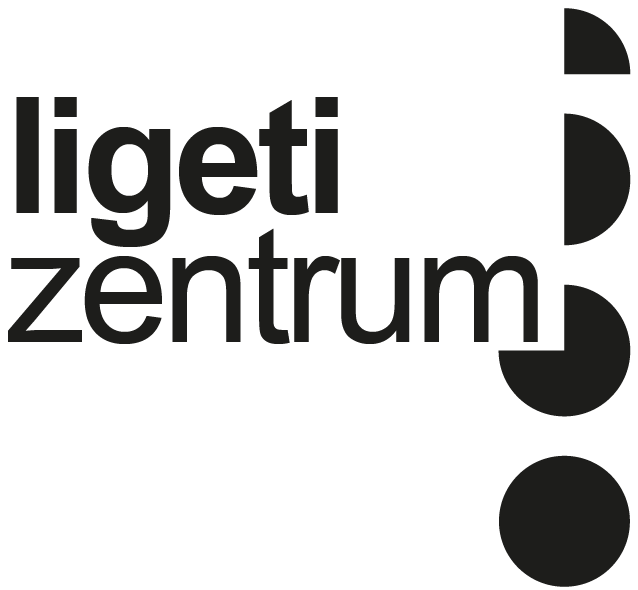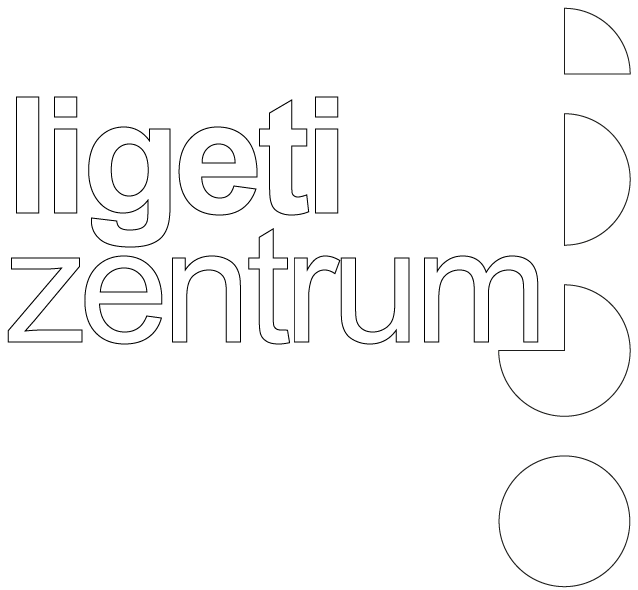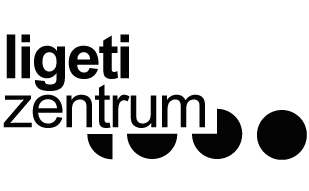ArtSearch 2024: International
Symposium on Artistic Research
24th October – 26th October 2024, ligeti zentrum, Veritaskai 1, Hamburg-Harburg
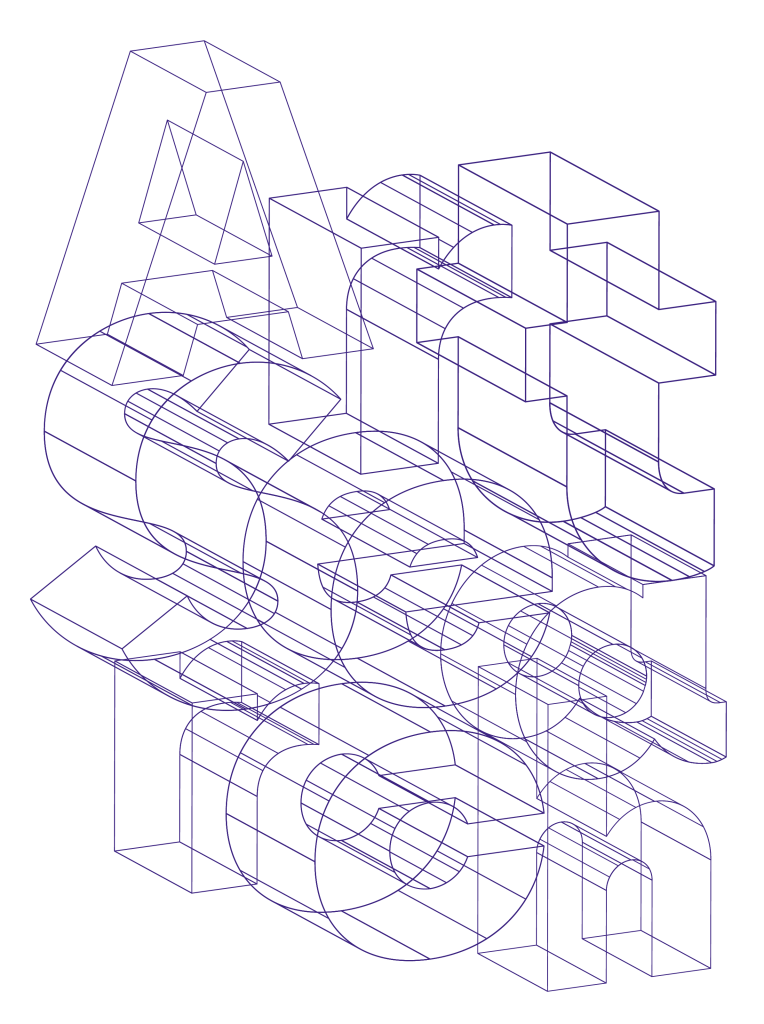
The ligeti center is organizing the international symposium ArtSearch from October 24th to October 26th, 2024. We invite international artists and researchers to apply and participate. ArtSearch 2024 will approach the topic of AI in the framework of artistic research from different directions. On the one hand, the handling and use of AI as a tool for artists will be discussed. On the other hand, there will also be contributions on AI as ‘Artistic Intelligence’, in the sense of a critical and affirmative approach: How can AI be used sensibly, where should it be scrutinised (by means of art) and where can even a certain recklessness in dealing with it be uncovered? Where can “Artistic Intelligence” even be necessary to avoid the use of technology?
In addition, important aspects of AI will be discussed: what can be an interim result about sustainability of AI and the data centres required for it? How can we shed light on socio-critical questions and stereotypes of machine learning and AI: e.g: How do discrimination and positions of power find their way into the use of AI?
ArtSearch was launched at the HfMT Hamburg in 2016 and was held for the second time in 2020. The third symposium in 2024 will once again aim to bring researchers and artists together to discuss current developments in the field of artistic research.
The ligeti center, located in Hamburg Harburg, was founded as a joint project by the Hamburg University of Music and Drama (HfMT), the Hamburg University of Technology (TUHH), the Hamburg University of Applied Sciences (HAW) and the University Medical Center Hamburg-Eppendorf (UKE). It operates as a knowledge translation project at the intersection between art and science.
Facts and figures:
Date: October 24 (start: 1:30 p.m.) to October 26 (end: 10 p.m.)
Where: ligeti center, Veritaskai 1, 21079 Hamburg Harburg
How to registrate as passive participant: Participation as a passive participant is still possible for all interested parties without submitting applications for paper/workshop/music. Please register here: https://easychair.org/my/conference?conf=artsearch2024
Registration deadline: October 16
Satellite Events: Two concerts will be held as satellite events in the Resonanzraum Hamburg. All participants are required to purchase their own tickets (please see timetable). Please note that these events cannot be attended live or online at a later date.
Conditions of participation: Active and passive participants pay a one-off fee of €50. The fee is mainly to cover the cost of catering. Online participation: €30.
Conditions of participation for students: There is no participation fee. Only a contribution towards expenses of €10 must be paid for catering during the symposium.
Travel and accommodation: are to be financed by the participants or their institutions. A contingent of hotel rooms will be reserved and held back (please mark with a cross on the registration form).
Kontakt: artsearch@hfmt-hamburg.de
Information: https://ligetizentrum.hfmt-hamburg.de
Program
Thursday 24th October

Welcome
Jan Philipp Sprick, Georg Hajdu, Benjamin Helmer
KeyNote: Axel Dürkop
Unreal Conditionals

Paper session 1: Jan Philipp Sprick
Artistic Research in Current Institutional Discourse

Paper session 1: Stephanie Schroedter
Choreomusical Research as Artistic Practice – exemplified by György Ligeti’s 18 Études pour piano

Paper session 1: Michael Hirschbichler
Drecksarbeit/dirty work. Analog Intelligence

Paper session 1: Maria Lindeman
Towards explorative and collaborative processes in opera
Coffe break

Workshop: Pavlos Antoniadis
Concert 1
Pavlos Antoniadis Nicola Hein Yuri Matsuzaki Martin Heinze
Friday 25th October
Coffee

KeyNote: Janne Kummer

Paper session 2: Lisa Hoffmann
Augmented Reality in alternative documentarisms of crisis and catastrophes

Paper session 2: Nicola Hein
Investigating Musical Listening and Identity through Human-Machine Improvisation and AI

Paper session 2: Sanja Bojanic
AI's Dual Edge: Moving Beyond Copy-Paste to Preserve Human Agency and Creativity

Paper session 2: Sam Penderbayne
Cross-Genre Composition: Opening the Classical Music Tradition
Lunch break
Paper Session 3: Steffen Krebber
sinusoidal run rhythm
Paper Session 3: Margita Margo Zálite
Exploring AI as a Tool for Social Justice in Arts Education. A Case Study of the Arts University
Paper Session 3: Gijs de Boer, Vera van der Burg
Gazing at your Gaze: self-trained algorithms as reflexive mirrors for artists
Paper Session 3: Benjamin Sprick
Epistemic Dromology Art, Knowledge, Speed

Coffe break

Workshop: SPIIC+

Meet&Greet

Satellite Event: Concert 2: Music in the Global Village edition II

Dinner
Saturday 26th October

Coffee

Paper session 4
Fausto Lessa Pizzol: Defy Gravity: Navigating Constraints and Creative Opportunities of Performing in a Bass and Vocal Duo // Benjamin Scheuer: Georges Aperghis' Thinking Things: Robotics and AI as inspiration for music theater

Paper session 4: Lea Luka Sikau, Denisa Pubalova, Julie-Michèle Morin
The Gut Rehearses to Tell You Something: Artistic Research Processing Intestines

Paper session 4: Miriam Akkermann
From Generative to Artificial? Observing Music Creation Processes

Paper session 4: Lorenzo di Romano
Rework: Embedding the Creative Processes of Remix in the Chamber Opera La Luna

Lunch break

Workshop: Zander Porter

Final round table

Satellite Event: Concert 3: THE ART OF IMPROVISATION 24 II
Thursday October 24
Conference // 9th floor | Conference Room
1:30pm Welcome | conference room
Jan Philipp Sprick, Georg Hajdu
2pm KeyNote Axel Dürkop | conference room
The Hidden Costs and Potential Benefits of AI: How can questions of AI and sustainability inspire artistic creation?
Artificial intelligence (AI) could save the climate, advance the energy transition, boost the economy, significantly improve human health and well-being and promote creative and artistic processes. At the same time, current AI approaches consume large amounts of energy and resources, the living and working conditions of many people in AI development processes are inhumane and digital data sets are used to train AI systems without the consent and compensation of the creators. Many unresolved problems raise questions of ethics and sustainability. How can the arts respond to this? Do we need a new art of justice that critically accompanies the discourse of AI?
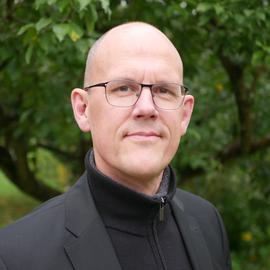
Axel Dürkop. Philosopher, theater maker, software developer. “For an open and democratic society, I actively shape free software, participatory education and an independent internet from an informatic, philosophical and artistic perspective through code, text and event formats.”
3pm Paper session 1 | conference room
3pm
Jan Philipp Sprick
Artistic Research in Current Institutional Discourses
Artistic research is currently a widely discussed topic at universities of music in Germany. Both content-related and institutional issues are being discussed. In this lecture, I would like to focus on institutional issues and challenges.These concern not only the question of how artistic and scientific doctoral programs differ, but also the question of how potential doctoral students in the artistic-scientific field are prepared for doctoral studies in their previous studies. In addition, the question remains as to how appropriate supervision of doctoral projects can be guaranteed in a field in which many potential supervisors from the artistic field do not have a doctorate themselves, or where the scientific supervisors are not necessarily artistic researchers. I would also like to speculate on what role artistic-scientific doctorates will play in the future when it comes to filling artistic teaching positions at universities.
Jan Philipp Sprick studied music theory, musicology, history and viola in Hamburg, at Harvard University and at the Humboldt University in Berlin, where he received his doctorate in musicology in 2013. From 2006, he taught music theory at the Hochschule für Musik und Theater Rostock, moving to the Hochschule für Musik und Theater Hamburg in 2018. After serving as vice president for studies and teaching, he has been president of the university since 2022.
3:25pm
Stephanie Schroedter
Choreomusical Research as Artistic Practice – exemplified by György Ligeti’s 18 Études pour piano
My reflections on interweavings of music/sounds and dance/movements begin with a statement by the composer and percussionist Lukas Ligeti, who believes that “all music is danceable if you understand what it is about”. This could be in line with cognitive science based studies in music theory, which state that we – spontaneously and intuitively – perceive music as an invisible yet audible movement in space and time. In this context György Ligeti’s descriptions of his compositional process are also revealing. In addition to listening and sound imagination, Ligeti senior gives special importance to a very fine sense of movement – sensorimotor skills which also include haptics and tactility. Such a direct connection between listening and moving – ultimately a kinesthetically permeated listening – is also essential for those choreographic works that start from musical templates in order to “translate” them artistically and creatively. As an example, Elisabeth Schilling’s choreography Hear Eyes Move is used to analyze György Ligeti's 18 Études pour piano.
Such multisensory translation processes cannot primary be about creating analogies between musical and dance parameters. Rather, it is also important to emphasize the differences between the various materialities and medialities of the arts, which interfere (e.g. through de-/synchronization processes) as well as they emerge (e.g. through overlays of comparable expressive qualities). Based on this premise, not only the structural nature of composition and choreography and their relationships are of interest when analyzing the interplay of music and dance. Questions also arise about possible audiovisual, kinesthetic or sensory perceptions. Against this background the so-called choreomusical research – whether as an artistic practice or as a theoretically based analysis – can be supplemented by perceptual-aesthetic reflections and extended in the direction of a research into sound and performative movement.
Stephanie Schroedter, music and dance scholar, is professor for Theories of Music and Movement/ Rhythmics at the University of Music and Performing Arts Vienna, where she is also involved in the artistic doctoral program. After completing her doctorate at the Musicology Institute of the Paris Lodron University Salzburg she has taught as research fellow, visiting and substitute professor for musicology, dance studies, as well as theater/performance and media studies and worked in several research projects supported by the German Research Foundation (DFG) and the Swiss National Science Foundation (SNSF). In 2015 she received the “venia legendi” (“venia docendi”) for Musicology and Dance Studies from the Freie Universität Berlin (2015). Her last research project “Bodies and Sounds in Motion” (funded by the DFG) dealt with methods for analyzing the interweaving of music/sound and dance/movement in performances of the late twentieth and early twenty-first century.
Keywords: Choreomusical Research, Choreomusicology, Performance Analysis, Translation Studies, Interweaving of Sound and Performative Movement, Interdependencies, Interferences, Forms of Vitalities, Kinaesthesia, Kinaesthetic Listening
3:50pm
Michael Hirschbichler
Drecksarbeit / Dirty Work. Analog Intelligence
In his talk, Michael Hirschbichler advocates Drecksarbeit (dirty work) as a contemporary mode for art and world making.
“Amidst contaminated landscapes, covered with tenacious traces and endless claims and ideologies, with hopes, dreams, fears and stories, with waste, waste, waste, all art and all life is dirty work.
Instead of adding new promises and toxins, wouldn’t it make sense to figure out what to do with all those that are already here and that won’t just go away?
Rather than starting from scratch, dirty work attends to accumulated pasts and attempted and aborted futures. It grapples with the leftovers, fragments, debris of things, ideologies and lives, with the facts and fictions that haunt every spot on Earth, with the many ghosts that abound and demand engagement.”
Quoted from: Michael Hirschbichler, “Drecksarbeit / Dirty Work. A Manifesto,” in Review Summer 2022 (Vienna: IKA, Academy of Fine Arts Vienna), 20.
Michael Hirschbichler is a transdisciplinary artist working across architecture and anthropology – with his practice Atelier Hirschbichler and as professor for design and experimental creation at HafenCity University Hamburg. In his work and research, he investigates the connections between spaces and worldviews. With an approach that he calls ‘dirty work,’ he engages with places, landscapes, and environments, along with associated tales, memories, myths, and ideologies. By critically exploring the existing and combining both material and immaterial aspects, facts, and fictions, he attempts to construct a possible situated worldview of our time. Michael Hirschbichler was a lecturer at ETH Zurich and HSLU Lucerne, the director of the Architecture Program at the Papua New Guinea University of Technology, a visiting professor at the Academy of Fine Arts Vienna and a postdoctoral researcher at TU Delft, Goldsmiths and Aarhus University. He was an artist-in-residence at the German Academy Villa Massimo in Rome, YARAT Contemporary Art Space in Baku, the Cité internationale des arts in Paris, Binz39 Foundation in Zurich, Villa Kamogawa (Goethe Institut) in Kyoto and SACO (Goethe Institut and Institut Français) in Antofagasta. His work has been shown, among others, at Martin-Gropius-Bau (Berlin), artQ13 (Rome), Kunstverein Ingolstadt, House of Architecture HDA (Graz), Helmhaus (Zurich), Kunstmuseum Wolfsburg and Het Nieuwe Instituut (Rotterdam).
www.hcu-hamburg.de/prof-dr-michael-hirschbichler
4:15pm
Maria Lindeman
Towards Collaborative and Explorative Processes in Opera
Maria Lindeman's research focuses on artistic leadership and the particular skills needed for interdisciplinary and collaborative creative processes. Through workshops and performances, Lindeman explores how new technologies and improvisation can inspire innovative practices in opera. The goal is to discover new forms of expression and working methods in the field, while analyzing which elements of leadership and collaboration pave the way for these alternatives.
In her presentation, Lindeman examines interdisciplinary collaboration through the concept of "artistic intelligence," referring to the vast tacit knowledge artists carry and apply in practice. Over the past two years, Lindeman has worked on two artistic projects that integrate interdisciplinary collaboration and emerging technology. She will present practical examples from these processes and their artistic outcomes. Both performances feature interactive audio-visual technology, including hologram projections.
Maria Lindeman is a director, dramaturg, actor, and educator in the field of performing arts. Her work also includes arts management and entrepreneurship. She is currently pursuing a PhD in directing contemporary opera at Stockholm University of the Arts, with a particular focus on the director's role in interdisciplinary and collaborative creative processes involving interactive technology.
4:45pm Coffee break | kitchen/9th floor
//
5:50pm Workshop: Pavlos Antoniadis: Human and AI synergies for the embodiment of complex rhythm | Production Lab
All-day installation: Enrico Dorigatti | 9th floor
hyperobject::01
Modern technology exists as a hyperobject; it is immensely vast and complex—the sheer scale of it exceeds our ability to ever fully comprehend its complexity. It is all-pervading and in constant proliferation, encompassing vast networks of devices, software, and digital infrastructures that underpin our modern world.
Through the interaction of abstract imagery and sounds rooted within the post-digital and glitch aesthetics, and realised through generative and algorithmic techniques, hyperobject::01 aims to explore our understanding of this complex phenomenon—our limits of reality and human perception with complex concepts such as data—inviting the audience to contemplate and reflect on the vastness of the world we inhabit and our place within it, both physically and metaphorically, as technology becomes every day more ubiquitous and irreplaceable.
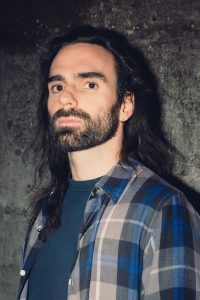
Enrico is a sound artist and creative technologist working across different formats. He is especially interested in the artistic exploration of indeterminism, audio-visual interaction, generative systems, and shared agency between humans and machines. He is a conservatory graduate in electroacoustic music composition (BA and MA). His artistic and scholarly output has been presented internationally. internationally.
Workshop // 10th floor | Production Lab
5:30pm Workshop 1: Pavlos Antoniadis
Human and AI synergies for the embodiment of complex rhythm
I will demonstrate multiple approaches to learning complex piano music, featuring work by Iannis Xenakis, Brian Ferneyhough, Olivier Messiaen and György Ligeti. Emphasis will be given on the development of interactive multimodal systems for symbolic rhythm learning based on 4E cognition. Deciphering complex notated rhythms through AI-assisted physical movement, but also generating complex rhythms in AI-assisted comprovisation settings, are the main takeaways of this performance-lecture.
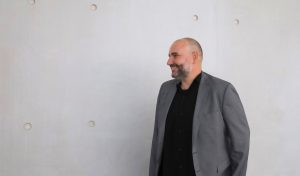
Pavlos Antoniadis is a pianist, musicologist and creative technologist from Korydallos, Athens, Greece, currently Associate Professor of Music Communication and Technology at the University of Ioannina, Greece, research collaborator with the team ismm and the ERC REACH at IRCAM, Paris, and PhD supervisor and visiting professor in Artistic Research at Lund University, Malmö.
Ηe has performed in Europe, North & South America and Asia with the new music ensembles Work in Progress-Berlin, Kammerensemble Neue Musik Berlin, Phorminx, ERGON, Accroche Note, Contemporary Inisghts. As a soloist, he has performed with the Thessaloniki State Symphony Orchestra, he has worked with composers such as Mark Andre, Helmut Lachenmann, Brian Ferneyhough, Wolfgang Rihm, Tristan Murail, Richard Barrett, Walter Zimmermann, Wieland Hoban, and he has premiered solo piano works by James Erber, Nicolas Tzortzis, Andrew R. Noble, Luis Antunes Pena, Dominik Karski, Laurentiu Beldean, Lula Romero, Uday Krishnakumar, Irene Galindo Quero, Frank Cox, Michael Edward Edgerton among others. He has recorded for Mode (2015 German Recording Critics Award/Deutscheschallplattenkritikspreis), Wergo and Diatribe Records.
His programming features the most complex contemporary works, extremes of physicality, live electronics, multimedia, sensors, Virtual and Augmented reality and musical theatre, often in eclectic dialogue with ancient repertoire from Cabezón to Bartók. He is also active in free improvisation, collaborating with Panos Ghikas or with the Improtech community and notably Mikhail Malt (IRCAM ERC REACH programme) for AI-assisted improv, and has collaborated with the physical theatre group Zero Point (Athens).
Pavlos studied the piano with Chryssi Partheniade, Ian Pace, Geoffrey Douglas Madge and Aleck Karis. In ensemble performance, he was a Fellow of Ensemble Modern and Klangforum Wien. He holds a prize-winning PhD in musicology from the University of Strasbourg in co-direction with the IRCAM, an MA in piano performance from the University of California, San Diego on a Fulbright Scholarship, and an MA in music studies from the University of Athens. He has conducted post-doctoral research at EUR-ArTeC, Université Paris 8 and at the Technische Universität Berlin – Audiokommunikation as a Humboldt Stiftung Fellow.
His research interests include embodied cognition, complexity, embodiment, multimodality, sensor-based interactive technologies, machine learning, Artificial Intelligence, Augmented and Virtual Reality and biopolitics, with a focus on technology-enhanced learning and performance for musics of the 20th and 21st centuries. He is the author of multiple publications, including two forthcoming monographs from Wolke Verlag and EUR-ArTeC and a collective volume on the music of Anestis Logothetis, and has given over seventy lecture-performances in universities and research centres around the world, while pursuing an active performing career.
www.pavlosantoniadis.wordpress.com/about
Photo: Attached, ©Giorgos Skitzakos
Concert // 10th floor | Production Lab
8pm | Concert 1
Lecture Performance
Rediscovering Brian Ferneyhough's Carceri d’Invenzione 2c.
Yuri Matsuzaki | Flute, electronic, lecture
Lecture Performance
Saatgut Proxy
Martin Heinze | composition, electronic, live-performance
Tertiary Protentions
Nicola L. Hein | composition, electric guitar electronic, musical agent system
Homage à Luigi Nono
Luigi Nono: ...sofferte onde serene...for piano and tape (1975-77, 14 min)
Pavlos Antoniadis: 你們是蟲子 (You are bugs) - Hommage à Liu Cixin, for Piano, ROLI Seaboard RISE 2, BITalino R-IoT sensors and AI agents SOMAX2 & GesTCom, avant- première (2024)
Pavlos Antoniadis | piano, electronic, composition
Program Notes
Rediscovering Brian Ferneyhough's Carceri d’Invenzione 2c.
The aim of this lecture performance is to explore and update decoding, rehearsal and performance strategies for Ferneyhough's music using new technology, and most specifically to revisit the piece “Carceri d’Invenzione 2c”.
Brian Fernyhough’s catalog includes solo pieces for the entire flute family. His unique scores can be regarded as multimodal platforms. They invite performers to develop a variety of interpretive strategies and to achieve different sonic results. However, performers often find it difficult to free themselves from interpretative traditions and habits of earlier Western musical styles. This is a precarious situation. Ferneyhough's scores contain so much information that their decoding is not only a question of personal interpretation, but allows a wider reflection on the interpretive realization of contemporary music based on new aesthetic approaches and technologies.
Ferneyhough's cycle Carceri d'Invenzione was composed between 1981 and 1986. The Flute Concerto Carceri d'Invenzione 2a stands out as the heart of the cycle. Given its popularity, Ferneyhough made three arrangements with reduced instrumentation. The arrangement Carceri d'Invenzione 2c for flute and tape however, has been woefully neglected in performances and recordings due to its lack of visibility and accessibility. The hitherto only existing score—a handwritten manuscript—can only be consulted on location at the Paul Sacher Foundation in Basel.
Therefore, as part of my doctoral studies I decided to copy end engrave the score, and to update the tape recording. The tape is going to be synchronized using ICST’s "PolytempoNetwork" software and “Max”, eliminating the need for a click track, cables and headphones. This not only gives performers more freedom of movement, but also vastly improves the listening experience for the audience. The presentation of the piece at “ArtSearch 2024” will be a landmark as it will be the first performance of this work in Germany since 1987.
Saatgut Proxy
Ever since AI (artificial intelligence) models became popular tools for artists and practitioners, the discourse has been dominated by questions surrounding the creative agency of humans employing them. Typically, the underlying concern seems to be that the use of AI-based technology diminishes the role of human artists; a key effort of practitioners being to find a way to effectively integrate AI into a collaborative creative process without removing the human agent from the equation.
With focus on AI in music and the audio domain, the author proposes, that an example of a joint creative act of human and AI agents presents itself in the practice of Latent Jamming, a combination of techniques of real time intervention in the latent space of VAE architecture-based audio models.
As an example, the author created Saatgut Proxy, an experimental setup in Pure Data that generates both randomized and repeatable pathways through the latent space of two neural audio model-architectures developed at IRCAM (RAVE, vschaos2). These models have been trained on the author’s musical body of work in order to set a common aesthetic baseline for both agents involved in Latent Jamming.
The author comes to the conclusion, that AI models can be considered generative instruments. Their role in the creative process, such as the ability to surprise and ignite human creativity, is defined by the amount of control human agents are willing to give up. Being eager to play with rather than thoroughly controlling these models/ instruments might therefore bear the most fruitful outcome in terms of a joint creative act.
At ArtSearch 2024, the author will perform live with the above mentioned framework, optionally followed by a Q&A on the details of model training as well as insights on practical research efforts in human and artificial agent collaboration in a shared creative process.
Tertiary Protentions
Tertiary Protentions is Nicola L. Hein’s solo project working with artificial intelligence in a solo real-time format. It develops a
software musical agent system capable of learning human musicians’ musical gestures and idioms in real-time.
The human and the machine musician develop an integrative system of musical materials and agency that integrates different strata of action.
Their modes of interaction are characterized by “cybernetic listening,” the human-machine system’s listening for influx by itself,
creating and stimulating the emergence of agency between human and machine. This systemic design enables a play between human and machine,
utilizing what the great French philosopher of technology Bernard Stiegler would have called “Tertiary Protentions”:
The conception of the future through technology, at the same using and questioning the very conception of technology.
Homage à Luigi Nono
On the occasion of Nono’s birth centenary, I pair his classic work for piano and tape with a new work of mine, which extends Nono’s techniques through live AI tools and multimedia, reflecting on Liu Cixin’s dark forest hypothesis.
Artist Biographies
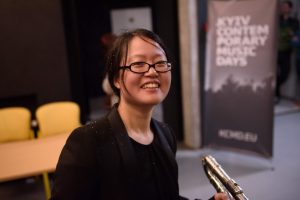
Japanese flutist Yuri Matsuzaki is acclaimed by the international music community, having won numerous first prizes in competitions, including the International Competition for Contemporary Music Performance in Karlsruhe, Germany. Yuri is a globally active musician and has performed throughout Europe and East Asia. She was invited artist at festivals such as Acht Brücken, the Witten Days for New Chamber Music, the Darmstadt Summer Course, the festivals ManiFeste at Ircam, Abbay de Royaumont, Gaudeamus Muziekweek, Witold Lutosławski and the Kyiv Contemporary Music Days. As ensemble musician Yuri plays regularly with Ensemble Modern in Frankfurt a.m. and Contemporary Insights e.V. in Leipzig. Yuri currently teaches performance practice for contemporary music at the Hochschule für Musik Dresden and is a doctoral candidate at the Kunstuniversität Graz. She has received scholarships from several institutions, including the International Ensemble Modern Academy, the DAAD, and the Japan Agency for Cultural Affairs. She holds a bachelor’s degree from the Tokyo University of the Arts and completed her master’s degree and Master Class Exam at the Hochschule für Musik und Theater Leipzig, where she studied with Prof. Irmela Boßler.
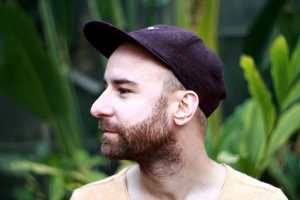
Martin Heinze is a sound artist, composer and electronic musician working in the field of experimental electronic dance music and generative art.
He holds a Master’s Degree in Media Arts, Art Theory and Media Sciences from the University of Arts and Design (HfG) Karlsruhe, Germany.
Heinze writes and performs under artist names Martsman, Anthone and Bokeh (in collaboration with Katsunori Sawa) amongst others. His works have been published on numerous electronic music labels, such as Hidden Hawaii, Offshore, Hospital and his self-established The Weevil Neighbourhood, a creative outlet for music and media art.
His current practical research focus revolves around generative frameworks for Jungle and Drum & Bass as well as generative AI in real time audio/ neural audio synthesis. His works have been awarded at IRCAM’s Generative Music Prize and Swing By Young Art Award.
Heinze is presenting on shared human/AI and creative agency, most recently at Storytellers+Machines conference, hosted by SODA, Manchester and as guest lecturer at University of Arts and Design (HfG) Karlsruhe.
http://www.martsman.de /// surprise@martsman.de
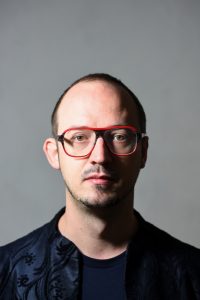
Nicola L. Hein is a sound artist, guitarist, composer, and researcher in music aesthetics and cybernetics. He is a professor of digital creation and artistic director of the studio for electronic music at the University of Music Lübeck.
His work is determined by the interaction of sound, space, light, movement, and the emergent dynamics of aesthetic systems. In his artistic work, he uses physical and electronic extensions of synthesizers and electric guitar, sound installations with motors/video projections/light, cybernetic human-machine interaction with interactive A.I. music systems, augmented reality, telematic real-time art, ambisonic sound projection, instrument-making, conceptual compositions. Intermedia works with video art, dance, literature, and other art forms. The interdisciplinary collaboration with many different artists* from music and video art, dance, theater, literature, painting, and many more play a central role in his artistic work. With the support of the Goethe-Institut and many other institutions, his works have been realized in more than 30 countries in North America, South America, Africa, Asia and Europe. His artistic work is documented on over 30 CD, tape, and vinyl publications on international labels such as Clean Feed. He has been awarded many different prizes and grants for his work. In sound art and improvised music, he has collaborated with many internationally renowned artists: Max Eastly, Evan Parker, Miya Masaoka, Axel Dörner, Ute Wassermann, and many more. Presentations of his work have taken place at MaerzMusik Festival (Berlin), Ars Electronica (Linz), Moers Festival, A L'ARME! FESTIVAL (Berlin), Super Deluxe (Tokyo), Sonica Festival (Glasgow), Experimental Intermedia (New York), and many more.
More information at: https://nicolahein.com/

Pavlos Antoniadis is a pianist, musicologist and creative technologist from Korydallos, Athens, Greece, currently Associate Professor of Music Communication and Technology at the University of Ioannina, Greece, research collaborator with the team ismm and the ERC REACH at IRCAM, Paris, and PhD supervisor and visiting professor in Artistic Research at Lund University, Malmö.
Ηe has performed in Europe, North & South America and Asia with the new music ensembles Work in Progress-Berlin, Kammerensemble Neue Musik Berlin, Phorminx, ERGON, Accroche Note, Contemporary Inisghts. As a soloist, he has performed with the Thessaloniki State Symphony Orchestra, he has worked with composers such as Mark Andre, Helmut Lachenmann, Brian Ferneyhough, Wolfgang Rihm, Tristan Murail, Richard Barrett, Walter Zimmermann, Wieland Hoban, and he has premiered solo piano works by James Erber, Nicolas Tzortzis, Andrew R. Noble, Luis Antunes Pena, Dominik Karski, Laurentiu Beldean, Lula Romero, Uday Krishnakumar, Irene Galindo Quero, Frank Cox, Michael Edward Edgerton among others. He has recorded for Mode (2015 German Recording Critics Award/Deutscheschallplattenkritikspreis), Wergo and Diatribe Records.
His programming features the most complex contemporary works, extremes of physicality, live electronics, multimedia, sensors, Virtual and Augmented reality and musical theatre, often in eclectic dialogue with ancient repertoire from Cabezón to Bartók. He is also active in free improvisation, collaborating with Panos Ghikas or with the Improtech community and notably Mikhail Malt (IRCAM ERC REACH programme) for AI-assisted improv, and has collaborated with the physical theatre group Zero Point (Athens).
Pavlos studied the piano with Chryssi Partheniade, Ian Pace, Geoffrey Douglas Madge and Aleck Karis. In ensemble performance, he was a Fellow of Ensemble Modern and Klangforum Wien. He holds a prize-winning PhD in musicology from the University of Strasbourg in co-direction with the IRCAM, an MA in piano performance from the University of California, San Diego on a Fulbright Scholarship, and an MA in music studies from the University of Athens. He has conducted post-doctoral research at EUR-ArTeC, Université Paris 8 and at the Technische Universität Berlin – Audiokommunikation as a Humboldt Stiftung Fellow.
His research interests include embodied cognition, complexity, embodiment, multimodality, sensor-based interactive technologies, machine learning, Artificial Intelligence, Augmented and Virtual Reality and biopolitics, with a focus on technology-enhanced learning and performance for musics of the 20th and 21st centuries. He is the author of multiple publications, including two forthcoming monographs from Wolke Verlag and EUR-ArTeC and a collective volume on the music of Anestis Logothetis, and has given over seventy lecture-performances in universities and research centres around the world, while pursuing an active performing career.
Friday October 25
9th floor | Conference Room
9:30am Coffee
//
10am KeyNote: Janne Kummer: Unreal Conditionals
In the Keynote Unreal Conditionals, Janne Kummer offers propositions that reshape relations to automated technologies. As dominant narratives around artificial intelligence are demystified, potential histories resurface, retiring the false binary of it being a universal solution or all-powerful destructive force. Instead, to come to terms with technologies requires a critical engagement with the conditions they are shaped by and the conditions they create. Challenging imperial frameworks, new metaphors for the artificial and the intelligent unfold. Unreal Conditionals gestures at the possibilities that are already present but are rendered unreal.
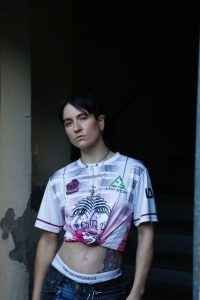
Janne Kummer (they/them, no pronouns) is a transdisciplinary artist in the field of performance and digital arts. JK's artistic practice is a continuous exploration of the politics of body representation, disidentification and the transformative potential of art, both in analog and digital spaces. Their work aims to question existing power structures and create alternative realities beyond capitalist exploitation logic. JK's background as a martial artist and active fighter (Muay Thai and K1) forms the foundation of their performative movement practice. Their creative process is informed by a trauma sensitive somatic understanding, recognising the body as a primary source of knowledge and healing.
In close collaboration with HAU Berlin, JK has created notable works such as “Unreal Conditionals”, "XBPMMM - A Travelogue of Morphing" and "The House of Monstress Intelligenzia." As an esteemed participant in artistic-performative research, JK has been a Fellow in several distinguished programs and initiatives, including the "DiGiTal" program of the Berliner Chancengleichheitsprogramm, the "ATLAS Choreography Residency Impulstanz" in Vienna, and the “Academy for Theatre and Digitality” Dortmund. They have been an associate researcher at the "Berlin Open Lab." They are alum of the German Academic Scholarship Foundation.
In addition to their artistic work, JK regularly leads seminars, workshops, and alternative teaching formats across academic, artistic, and community contexts, including at UdK Berlin, LUCA University of the Arts, ZHdK Zurich, HfS and FU Berlin, New Fears Gallery, ZKM Karlsruhe, Re:publica and HAU Berlin. They also organise a queer community workshop series focused on martial arts, trauma, power dynamics, self-defence, and play-fighting.
They are part of the queer wrestling collective 'liminal beast of prey' and the international QTMA network (queer trans martial arts fighters).
JK believes in collaborative processes and their potential to be a source of healing and meaningfulness.
11am Paper session 2 | conference room
11am: Lisa Hoffmann
Augmented Reality in alternative documentarisms of crisis and catastrophes
In times of digital image overload and the resulting polarization or, conversely, desensitization to media content, ATLAS OF THE ESSENCE offers an alternative documentary approach that visually renegotiates complex events such as natural disasters, conflicts, and social issues. The essence of such an event is captured through a method of superimposition, gathering several hundred to well over a thousand images. These images, researched online via search engines and social networks, come from professional photojournalists but, crucially, also from those directly affected and eyewitnesses. This multi-perspective approach, which does not provide a clear recognisable image but rather demands exploration through fragmented, at times abstract or indistinct representations, enables a critical narrative that diverges from classical image reporting, thereby opening a new perspective on traumatic events and their perception.
A key aspect of this artistic research is the conscious choice of a manual search for images instead of working with artificial intelligence (AI), and the use of augmented reality (AR) through which viewers activate a second, virtual layer of the work, revealing a flood of the processed images. This expansion provides an immersive experience that not only deepens the engagement with the event and its visual content but also prompts reflection on one’s own interaction with media representations. The combination of real and virtual imagery questions the fast-paced consumption of images and the accompanying desensitisation. AR acts as a critical tool to both question the boundary between real and virtual imagery and to transform the relationship to images, leading viewers into a dialogical process with the visual content.
Through the interplay of representations in real and virtual spaces, the boundaries of documentary and visual expression are expanded, creating space for the invisible, the unspeakable, the traumatic, and the ambiguous, which are inherent characteristics of each of the events. The various levels of ATLAS OF THE ESSENCE offer different entry points into these events, enabling an immersive, aesthetic, and sensory experience. The lecture will present the artistic research on alternative documentarisms and the inclusion of AR, using ATLAS OF THE ESSENCE and its various levels as a case study to illustrate and explain these concepts.
Lisa Hoffmann is a PhD candidate of artistic research of the Bauhaus University Weimar, funded by the Heinrich- Böll-Fundation. Before, she worked as photographer and activist in crisis areas like the Mediterranean Sea. Her work focuses on alternative documentarism, which uses multimedial materials and body experiences to create an multisensual approach to crisis, catastrophes and the subjective traumatic experiences of these. Her works and films have been awarded and exhibited internationally.
11:25am: Nicola L. Hein
Investigating Musical Listening and Identity through Human-Machine Improvisation and AI
In this talk I will adress my own artistic work in the domain of human-machine improvisation, using machine learning and AI, to think about the concepts of listening and identity involved. Revisiting different works and concepts in my artistic research work in this domain, I want to think about the relevent concepts of agency, listening and identity brought about in this practice. The interaction with autonomous musical agent systems that use machine learning to create performatively autonomous systems I want to discuss using the concepts of cybernetic listening, as the listening of a human-machine musical system, paying special attention to the media-specificity of listening in musical agent systems, and auto-cybernetization, as the training of a musical agent system on the musical material of a human musician, which can often be observed in Jazz-related and afrological
musical practices with musical agent systems.
Nicola L. Hein is a sound artist, guitarist, composer, and researcher in music aesthetics and cybernetics. He is a professor of digital creation and artistic director of the studio for electronic music at the University of Music Lübeck.
His work is determined by the interaction of sound, space, light, movement, and the emergent dynamics of aesthetic systems. In his artistic work, he uses physical and electronic extensions of synthesizers and electric guitar, sound installations with motors/video projections/light, cybernetic human-machine interaction with interactive A.I. music systems, augmented reality, telematic real-time art, ambisonic sound projection, instrument-making, conceptual compositions. Intermedia works with video art, dance, literature, and other art forms. The interdisciplinary collaboration with many different artists* from music and video art, dance, theater, literature, painting, and many more play a central role in his artistic work. With the support of the Goethe-Institut and many other institutions, his works have been realized in more than 30 countries in North America, South America, Africa, Asia and Europe. His artistic work is documented on over 30 CD, tape, and vinyl publications on international labels such as Clean Feed. He has been awarded many different prizes and grants for his work. In sound art and improvised music, he has collaborated with many internationally renowned artists: Max Eastly, Evan Parker, Miya Masaoka, Axel Dörner, Ute Wassermann, and many more. Presentations of his work have taken place at MaerzMusik Festival (Berlin), Ars Electronica (Linz), Moers Festival, A L'ARME! FESTIVAL (Berlin), Super Deluxe (Tokyo), Sonica Festival (Glasgow), Experimental Intermedia (New York), and many more.
More information at: https://nicolahein.com/
12pm: Sanja Bojanić
AI's Dual Edge: Moving Beyond Copy-Paste to Preserve Human Agency and Creativity
A cruelly simple paradigm (because it is a fundamental skill on which everything currently happening in the world rests) of the copy-paste technique should be replaced.
There is no way to defend against the possibility of copying and pasting everything we do. “ctrl+c/ctrl+p” is essential. This mechanism is one of the fundamental biases of any AI. And any human using AI.
A long time ago, technē covered technology, technique, arts... Let's return to the elementary cognitive skills that we should exercise when fancying:
- the basics of formal logic (deduction, induction, abduction)
- understanding of probability and statistics
- understanding of rhetorical figures and tropes (terribly important)
- and finally, the time invested in checking sources of information
This is also familiar, as the foundation of this distinction was established at that same time. The usages were not the same, which is part of the game.
Computation can be “analytical” or “generative,” so as a consequence, AI is twofold: analytical and generative.
- By its very nature, an “analytical” is a system dedicated to detection, recognition, classification, control, monitoring, and prediction. It is instrumental in surveillance, quality control, and predictive maintenance.
- “Generative” follows the same computational line and, at a certain point, becomes a suite of models capable of generating new data in the form of texts, still and moving images, sounds, music, and, increasingly, complex combinations of all these elements after being trained on large datasets.
Analytical and generative are actually “artificial perception” and “artificial imagination.”
- the algorithmic automation of the capacity to perceive
- the algorithmic automation of the capacity to imagine
The problem posed by artificial perception is the challenge of preserving the integrity of the individual amid the fear of policy being dictated by anticipatory statistics, which would merely perpetuate existing knowledge, trapping us in an endless control loop.
The danger lies in the potential for these systems to reinforce and amplify existing biases and inequalities, leading to a self-fulfilling prophecy where only the known and measurable are considered valid, thus stifling innovation and diversity.
What are their limits?
“Analytical AI's” perpetual monitoring and predictive capabilities could result in a society governed by statistical determinism, where the relentless pursuit of efficiency and optimization undermines human agency.
“Generative AI’s” artificial imagination presents challenges. It offers unprecedented creative possibilities (which we still need to detect) and raises questions about authenticity, originality, and the role of human creativity.
Sanja Bojanić, Academy of Applied Arts University of Rijeka
12.25pm: Samuel Penderbayne
Cross-Genre Composition: Opening the Classical Music Tradition
More than one hundred years after Schönbergs Verein für musikalische Privataufführungen and its accompanying (since falsified) hypothesis that broad audiences in the 2010s and 2020s would whistle serial tone rows in the street with the same effortless joy as they do tonal melodies, we stand before a tightening Genrefication of classical music that restricts it to a few dozen dead, white and male composers from colonial times. Cross-Genre music seeks to provide an artistic-academic system with which break out of such closed spaces and look over traditional borders into the diverse plethora of music-making in modern times.
Prof. Dr. Samuel Penderbayne is an Australian composer and artistic researcher, living and working between Hamburg and Vienna. His primary interest is in combining modern, non-classical music genres with contemporary classical composition, as such aiming for both an aesthetic and cultural “opening" of traditional practice. In addition to a classical music education, he has played in indie and prog-rock bands, produced progressive electronic dance music and composed film music.
After studies in Sydney and Munich, he was awarded the “Opernstipendium” of the Hamburg State Opera, University of Music and Theatre, Hamburg and the Claussen-Simon Foundation to write a dissertation and compose a full-length chamber opera based, resulting in the work “I.th.Ak.A.” (2018) and a textual analysis of the work under a newly developed framework of Cross-Genre Composition, which was awarded summa cum laude (1,0). Subsequently, he composed operas for the Zurich Opera House, Deutsche Oper Berlin, Komische Oper Berlin, Lucerne Opera, Music-Theatre Aalto, Neuköllner Oper Berlin and Deutsche Oper am Rhein and taught artistic research at the Hamburg University. Recently, he was named Professor of Composition at the Music and Arts University of the City of Vienna.
In addition to artistic practice, research and teaching, he curates - together with pianist Henriette Zahn - the biennial NORDLIED-Festival for progressive song art in Hamburg, which explores new formats of “lied" recital and places them in a discursive-active context.
1pm Lunch break | kitchen/9th floor
//
2pm Paper session 2 | conference room
2pm: Steffen Krebber
sinusoidal run rhythm
sinusoidal run rhythm is a basic research in rhythm theory generated by adding up in-phase cosine functions in whole number ratios. These rhythms are temporally and dynamically shifted in their maxima compared to corresponding notated rhythms and feature a physicality and grooviness that is not present in discretely controlled rhythms. sinusoidal run rhythm thus conceives of rhythm as a wave and clearly stands out from the conventional rhythm theory of a European musical tradition. It opens up an inexhaustible variety of beguiling physical music.
The theory encourages us to unbound the borders between imagination and performance, score and interpretation, man and machine and search for applications in music-making, music analysis, psychoacoustics or philosophy.
A book, code and Ableton plugins have been released in 2023.
Steffen Krebber is composer, sound artist and researcher. His work oscillates between computer music, instrumental and electroacoustic composition, sound art, research, language, epistemology, sociology and media art. He has held scholarships from the Schloss Solitude Academy, the Schreyahn Artists Retreat, the Baden-Württemberg Art Foundation and the Konrad Adenauer Foundation and received the Bernd Alois Zimmermann Scholarship from the City of Cologne. His music has been performed at the Gaudeamus Muziekweek, the Witten New Chamber Music Festival, the ‘blurred edges’ Festival of Current Music (Hamburg), the ‘new talents’ Biennale (Cologne), Nachtstrom (Basle) and Piano+ at the Karlsruhe Center for Art and Media. He has also exhibited his work at the KOLUMBA Art Museum of the Archbishopric of Cologne, the Cologne Arts Association and the Schloss Solitude Academy. His language installation Weissagungen (‘divinations’) entered the permanent collection of the KOLUMBA Art Museum. As a composer he has worked with a great many ensembles and performers, including the Thürmchen Ensemble, Ensemble Praesenz, radikal translation, the Sonar Quartet, hand werk, LUX:NM, Ensemble Garage, Ensemble ascolta and the Stuttgart New Vocal Soloists as well as Manos Tsangaris, Truike van der Poel, Sabine Akiko Ahrendt and Dirk Rothbrust.
2:25pm: Margo Zālīte
Exploring AI as a Tool for Social Justice in Arts Education.
A Case Study of the Arts University
In the evolving landscape of the performing arts, artificial intelligence (AI) presents both opportunities and challenges. This talk examines how AI can be harnessed to promote social justice and inclusivity in arts education. Through a detailed case study of an innovative project implemented at the Hamburg University of Music and Theatre, the potential of AI to create more accessible and equitable learning environments is explored.
The discussion will highlight practical examples, such as AI-driven translation tools, virtual rehearsal spaces, and automated accessibility technologies that provide new opportunities for students from diverse backgrounds, including those with disabilities. While focusing on the advantages, the talk also critically addresses ethical concerns, questioning the role of human agency in a world increasingly influenced by technology.
As AI’s creative potential continues to evolve, this presentation encourages a reflection on the balance between innovation and ethics in artistic education, proposing a future where technology serves as a tool for a more inclusive, responsible, and sustainable performing arts sector.
Margo Zālīte is an interdisciplinary artist, curator, and lecturer working at the intersection of traditional performing arts and modern technology. Her work focuses on social and environmental justice, fostering innovative, sustainable, and inclusive practices in the arts. Margo holds a Master's degrees in Opera Directing from the Hanns Eisler Academy of Music in Berlin and Visual Anthropology at Freie Universität Berlin.
As a member of the artistic leadership team of the the Sustainable Theater Lab at the ligeti center in Hamburg, she combines her artistic vision with a commitment to creating impactful collaborations. Currently, she teaches music theater directing at the Hamburg University of Music and Theatre and continues to develop projects that explore the ethical integration of technology into arts education.
2:50pm
Gijs de Boer and vera van der Burg
Gazing at your Gaze: self-trained algorithms as reflexive mirrors for artists
AI in artistic practice is primarily used as a generative tool, with the practitioner cast in the role of prompter and refiner. Yet this can limit creative expression through constraints and biases inherent to underlying training data, and subscribes to an AI development trajectory of large-scale data extraction and energy consumption. We propose an alternative role for the artist using AI, by framing bias as an asset. If AI is always a mirror of its makers, can artists use it like one? We investigated how AI can support a reflexive practice, involving reflection on one’s judgements, belief systems and tendencies within one’s practice.
We developed a process of teaching an algorithm our subjective gaze, and having it gaze back at our own work. First we train an object-recognition model with a custom dataset related to our artistic fascinations and subjective labels. Then we let this subjective algorithm interpret an object portrait of our practices, with objects from our studio that embody our artistic fascinations, fears, desires. We first explored this process ourselves, and later in a 3-day workshop with artistic research students. We demonstrate how working with a self-trained algorithm organises productive moments of self-confrontation throughout the process. We conclude that AI, when used as a reflexive tool, can assist artists in understanding and developing their position in relation to a research topic, while preserving agency, authorship, and expression in creative work.
Vera van der Burg (NL) is a designer and researcher, currently working as a PhD candidate at Delft University of Technology within the Designing Intelligence Lab. Her research and design work focuses on the use of AI in creative processes, exploring how AI can serve as a tool for self-reflection. Vera creates publications, organises workshops and lectures, and makes installations for exhibitions.
Gijs de Boer (NL) is an artistic researcher and educator. He combines a background in philosophy and design to study how aesthetics and materiality could contribute to more relational ways of being. He makes visual works, writes essays, makes websites, and gives workshops. Gijs teaches artistic research and critique at the MA Critical Inquiry Lab at Design Academy Eindhoven and is part of Extra Practice.
3:15pm: Benjamin Sprick
Epistemic Dromology
Art, Knowledge, Speed
In the humanities and social sciences, European modernity is traditionally defined as a movement of acceleration. In the context of discourses around ›AI‹, this thesis is intensified, since something like an ›exponential‹ or ›excessive‹ temporality can be discerned here: The succession of groundbreaking innovations tends to overtake the logical structure of their reflexive interpretation.
The lecture explores meta-theoretical conclusions for the operational speed of artistic research contexts. In addition to concepts of the French philosopher Paul Virilio, theses from a book by the sociologist Emanuel Deutschmann, which has not yet been published (The Exponential Society. From the End of Growth to the Stabilization of the World, Suhrkamp 2025), will be relevant.
Benjamin Sprick was born in Hamburg in 1980, where he studied cello, philosophy and music theory. In 2020, he completed his doctorate at the University of Fine Arts (HfBK) with a thesis on Gilles Deleuze and the aesthetics of music. He currently teaches applied philosophy and aesthetics as well as cello at the Hamburg University of Music and Theater (HfMT). His research focuses on a »Critique of Instrumental Reason« as well as the entangled relationships between art, citizenship, and economics.
3:45pm Coffee break | kitchen/9th floor
//
5:45-6:30pm Meet&Greet | 9th floor
//
All-day installation: Enrico Dorigatti | 9th floor
hyperobject::01
Modern technology exists as a hyperobject; it is immensely vast and complex—the sheer scale of it exceeds our ability to ever fully comprehend its complexity. It is all-pervading and in constant proliferation, encompassing vast networks of devices, software, and digital infrastructures that underpin our modern world.
Through the interaction of abstract imagery and sounds rooted within the post-digital and glitch aesthetics, and realised through generative and algorithmic techniques, hyperobject::01 aims to explore our understanding of this complex phenomenon—our limits of reality and human perception with complex concepts such as data—inviting the audience to contemplate and reflect on the vastness of the world we inhabit and our place within it, both physically and metaphorically, as technology becomes every day more ubiquitous and irreplaceable.

Enrico is a sound artist and creative technologist working across different formats. He is especially interested in the artistic exploration of indeterminism, audio-visual interaction, generative systems, and shared agency between humans and machines. He is a conservatory graduate in electroacoustic music composition (BA and MA). His artistic and scholarly output has been presented internationally.
Workshop: 10th floor | Production Lab
4:15-5:45pm Workshop 2: SPIIC+
During the ArtSearch Conference 2024 SPIIC+ has invited a diverse group of highly acclaimed international performers /improvisors /scholars to take part in a two-day group workshop /exploration lab. /round table event. Following the motto of 'AI = Artistic Intelligence' the group will explore artistic practices and their transfer-ability to social, scientific and political contexts.
The group will share it's process and insights with the conference attendees in a presentation /workshop on Friday afternoon at ligeti zentrum and a full evening concert on Saturday - TAOI '24 II at Resonanzraum St. Pauli.
The acronym SPIIC+ stands for Social Performance, Interdisciplinary Improvisation & Creativity and is a part of the Artistic Research Lab. at ligeti zentrum under the leadership of Vlatko Kučan.
SPIIC+ explores contemporary concepts and practices of artistic production from the departure point of critical improvisation studies. Through re-evaluation of traditional notions of the artistic process - for example by understanding composition, improvisation and performance as related modes of the creative process rather then categorically disparate processes - the goal of SPIIC+ is to pave the path towards a holistic and embodied conception and practice of creative social interaction and artistic production.
JEAN-CHARLES FRANÇOIS (FR) - percussion
GYÖRGY KURTÁG JR. (FR/HU) - electronics
KATRIN BETHGE (DE) - light artist
SUSANNE MARTIN (DE) - dance
KATARZYNA BRZEZINSKA (PL) - dance
NICOLA L. HEIN (DE) - guitar
JOHN ECKHARDT (DE) - double bass
TAM THI PHAM (VN) - dan bau
HANIA MARIAM LUTHUFI (LK) - voice
MATHEUS SOUZA (BR) - electronics
VLATKO KUČAN (DE) - host, saxophones, clarinets
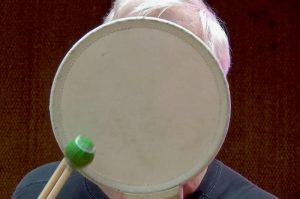
JEAN-CHARLES FRANÇOIS (FR) - percussion
A composer and percussionist, Jean-Charles François studied at the CNSMD in Paris. He was a freelance percussionist in Paris during the 1960’s. He was involved with the Domaine musical and Musique vivante from 1962 to 1969;
Between 1965 and 1969, he was the co-director of the Centre de Musique, at the American Center in Paris, together with Keith Humble and Giuseppe Englert.
François went on to teach in the Music Department of the University of California at San Diego, where he became Chairman. In 1975, he founded the experimental music group, Kiva.
From 1990 to 2007, he was the director of the Cefedem Rhône-Alpes (a center devoted to the training of future music school teachers) in Lyon.
In 1994, he joined the Aleph Ensemble as a percussionist. In 2007, he founded the improvisation ensemble PFL Traject with musicians from Lyon. The author of numerous articles on music theory, he published Percussion and Contemporary Music in 1991 (Klincksieck, Paris). His doctoral thesis (Paris VIII University, 1993) is on “The creative performer”.
He is a member of the contemporary music ensemble Aleph, Paris, of PFL Traject, Lyon, and PaaLabRes collective.
www.ensemblealeph.com
www.paalabres.org
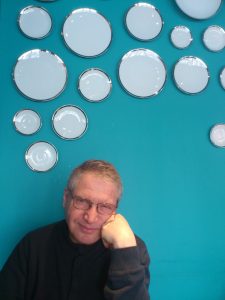
GYÖRGY KURTÁG JR. (FR/HU) - electronics
Composer, sound designer and improviser, he is since 2014, Arts/Sciences coordinator at the SCRIME computer music laboratory (University of Bordeaux - Science and Technology Department). This position enables him to link collaborative compositions and evolving scientific projects. In the past decades he has worked and performed in the most prestigious studios and concert halls around the world. (Ircam-Paris, Zkm - Karlsruhe; Guggenheim, New York; Carnegie Hall.
)
After completing his composition studies at the Frantz Liszt Academy in Budapest (Hungary), György Kurtàg joined the I.R.C.A.M team as a RIM, and composer-researcher (pedagogy dept and Instrumental Research Group). He has collaborated with some of most influential researchers in computer music field as Tod Machover (MIT Medialab, Futur Group), David Wessel (CNMAT Berkeley), George Lewis (The Center for Jazz Studies at Columbia University) as well as famous composers like Mauricio Kagel, Pierre Boulez, Sylvano Busotti, Péter Eötvös.
Deeply attracted to the visual arts, he has received musical commissions from the Centre Georges Pompidou, Musée du Louvre and Musée de Grenoble, as well as from visual artists, video artists and choreographers.
His research encompasses both collaborative compositions, evolving projects as well as the analysis and capture of the gestures of the instrumentalist, as well as the creation of new instruments. He is Artistic Director of SCRIME and President of the European Center FOR Improvisation.
« As a composer I am interested in collaborative work with composers, but also in evolving projects with performers. As a researcher, I am interested in the creation integrating both collective instruments and the pedagogy of expressive interactivity. As an improviser I experience a form of complexity that develops essential skills for the fluidity of a three-dimensional communication: Sensory intelligence (listening mobility, haptic perception, etc.) shared intelligence (human-machine communication), collective intelligence (free collective improvisation) » .
Records :
Face to face : Barre Phillips / Gyorgy Kurtag. (2022) ECM Records N°2735
Kurtagonals : (2008) ECM Records N°2097
Creation : moment’s Notice trio BMC Records CD 285
Zwiegespräch - Kurtag 80 : BMC Records CD 129
S(M)S : Lux Nox BMC Records CD 081
« The Well - Tempered Universe » SC.Art Fonogram-Hungary award)
https://youtu.be/rrKnFr8lxBc?si=sUbkqScq7Bx5wWxq
https://youtu.be/MJ8Z5skovLw?si=Bp_mQ7sJ9hhrt5Cd
https://youtu.be/FaUABVWc2pk?si=irSK8Qc9mGSoC6fb
https://youtu.be/M3Tr8mSDYl8?si=3xizzBPTGQ-FCU3L
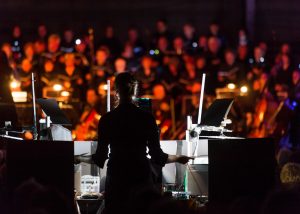
KATRIN BETHGE (DE) - light artist
Katrin Bethge begann nach dem Studium der Illustration an der HAW Hamburg 1999 mit der Arbeit mit Licht. Ihre Overheadprojektionen begleiten Projekte aus den Bereichen Tanz, Theater, Musik und Installation. Im Duo mit dem Bassisten John Eckhardt ist sie bei internationalen Festivals eingeladen, und gemeinsam realisieren sie Licht- und Klanginstallationen. Beim Hauptsache Frei Festival Hamburg erhielt das Tanzprojekt restructuring mit Veronique Langlott und Alexandra Griess den Jurypreis. Für die Installation „Lichtreise“ im Schleswiger Dom, bekam Katrin Bethge den Kulturpreis der Stadt Schleswig verliehen. Das Ensemble Resonanz begleitete sie beim Funkelkonzert in der Elbphilharmonie Hamburg und das Ensemble Modern in Frankfurt bei einem On Air Konzert. Im Herbst 2021 leuchtet sie zum 200. Jubiläum die Uraufführung „Schattengold“ Konzerthaus Berlin. Ihre Lichtinstallationen waren bei der Luminale in Frankfurt, den EVI Lichtungen, Hildesheim, der Hafensafari Hamburg sowie dem Tag des offenen Denkmals in Hamburg zu sehen.
Die Projektionen von Katrin Bethge verwandeln als vergängliche Malerei die Oberflächen des Raumes, in den sie fallen. Lichtbrechende Objekte, Flüssigkeiten und alltägliche Materialien werden direkt auf der Arbeitsfläche des Projektors bewegt, wodurch kosmische wie mikroskopische Räume aus Licht entstehen.
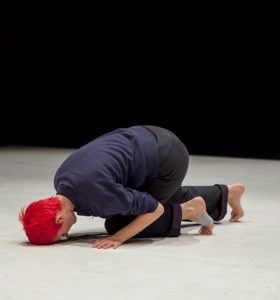
SUSANNE MARTIN (DE) - dance
is a Berlin-based choreographer, performer, researcher, and teacher in the field of contemporary dance and theatre. She presents her work internationally in solo performances and collaborative stage works. Her artistic practice and research focus on improvisation as choreographic practice, critical practices and narrations of age(ing), contact improvisation, artistic research methods, and improvisation-based approaches to learning, knowledge production and knowledge dissemination. Festivals that presented her performances include: International Dance and Theatre Festival (Gothenburg), Aerowaves (London), Nottdance (Nottingham), Opera Estate (Bassano del Grappa), Tanec Praha (Prague). Her PhD dissertation Dancing Age(ing): Rethinking Age(ing) in and through Improvisation Practice and Performance was published 2017 by transcript. In her postdoctoral research at EPFL, Switzerland (2018-2021) she examined dance improvisation in its potential to rethink and advance processes of learning, teaching and researching in a technical university.
Post navigation
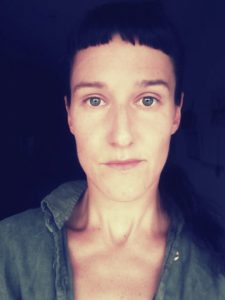
KATARZYNA BRZEZINSKA (PL) - dance
was studying at the Academy of Fine Arts and Design in Wroclaw (PL); Contemporary Dance, Improvisation & Performance in Silkeborg (DK) and Freiburg (DE). She is a freelance artist/choreographer/movement researcher in the field of choreography, dance and performance as well as sculpture and installation. She creates her own projects, participates in cooperation with artists in an international context and offers workshops and classes in the field of Movement, CI, Experiential Anatomy, Somatic Performance & Embodied Choreography as well as Instant Composition Research. In years 2017-2020, she was involved in the "DAS TANZNETZ Freiburg"; in the organisation, realisation and artistic conception of event formats, such as workshops, residencies and research laboratories in the field of dance and performance. Since 2019 she works also as an Ilan Lev Method Practitioner and ILM Movement Teacher mainly with dancers, performers and choreographers. Since 2022 she collaborates as an ILM Practitioner with Sasha Waltz & Guests Company in Berlin. Since 2023 she works within a frame of “Smart Cities Inkubator” under Victoria Hochschule in Berlin on establishing the company “BACK to BODY”, working between choreography, science of movement & preventive medicine.
Her current artistic interests include the following themes:
• The science of spaces within embodied and site specific practices
• Magic of dreams; poetry and imagination in relation to tangible facts of reality, physical and anatomical structures, body flesh, objects, senses, perception, colours, spaces, shapes, etc.
• Layers of female identity in relation to the system, culture, nature, inner and outer experience and other people
• "perfect imperfection"; in the context of research on strength, power, will, challenge, weakness, trust, vulnerability
• Frame of reference "many in one"; and "one in many"; as well as artistic presence

NICOLA L. HEIN (DE) - guitar
is a sound artist, guitarist, composer and scholar, working in the field of music aesthetics and cybernetics.
He is a professor of Digital Creation at the Music University of Lübeck, Germany.
His work is driven by the interaction of sound and space, light, movement, thought and the becoming of embodied and intermedial intelligence in aesthetic systems, community and technology.
In his artistic work he uses physical and electronic extension of the electric guitar, sound installations, cybernetic human-machine interaction with A.I. interactive music systems, Augmented Reality, telematic real-time art, ambisonic sound projection, instrument building, conceptual compositions, inter-media works (w/video art, light, dance, literature) and much more.
In his work as a sound artist he builds installations, sculptures, instruments, researches the interaction of sound, material and space, works with field recordings, programs (intelligent) software systems, creates a multitude of intermedial works, engages in network technologies and artistically develops dances of agency between the human, nature and technology.
He explores the possibilities of the electric guitar as a modular becoming of technology and sound. In this process the guitar is played with objects, extended techniques, stratified by the use of analog and digital effects as well software programming and is understood and developed as a creator of space and interaction. The use of Artificial Intelligence/machine learning, ambisonic spatialization and the interaction with autonomous interactive music systems play a central role in his practice.
His research revolves around questions of philosophy of music, epistemology, aesthetics, media theory, critical improvisation studies and cybernetics. It follows questions of the creation of identity and sense in interactions between humans and technology, investigates the philosophical implications of musical and intermedial practices.
He studied Jazzguitar, Soundart/Composition, Philosophy and German philology at the Friedrich-Wilhelms Universität Bonn and the Gutenberg-Universität Mainz. He was invited twice as a visiting scholar at Columbia University, New York City (2017-2018, 2019-2020), working with Prof. George E. Lewis. Currently he is pursuing his Ph.D. in Music at Columbia University in New York.
His work has been shown internationally at institutions and festivals such as the Museo Arte Moderno (Medellín), Ludwig Museum (Budapest), Acht Brücken (Cologne), Moers festival, MaerzMusik (Berlin), Harvestworks (New York City), Ars Electronica (Linz), Mapping Festival (Geneva), Mirage Festival (Lyon), Experimental Intermedia (New York), Experimental Sound Studio (Chicago), Walcheturm (Zürich), Dark Circuits Festival (New York), Super Deluxe (Tokyo), Sonica (Glasgow), Klex Festival (Kuala Lumpur), Hong Kong New Music Ensemble (Hong Kong), NIME (Birmingham and Shanghai), Festival International de Cine (Mexico City).
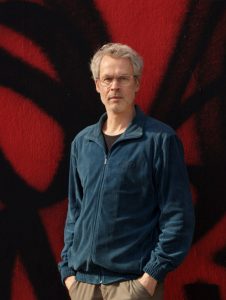
JOHN ECKHARDT (DE) - double bass
Whether performing today’s most challenging double bass repertoire, developing his own music, or working sound systems with a bass guitar or a set of turntables - John Eckhardt is testing the limits of being a bassist on planet earth in the 21st century, working towards a broader vision of what bass always was and can become in the future.
Seeking to combine scope with depth, John Eckhardt is constantly involved in the creation of new music and has both collaborated with a wide spectrum of artists and created his personal brand of solo projects. He worked with many composers including Helmut Lachenmann and Pierre Boulez, top new music groups such as Ensemble Modern, Klangforum Wien and musikfabrik, improvisors from Evan Parker, Elliott Sharp, Peter Brötzmann and Peter Evans, to today’s new blood in a wide field of today’s music.
John Eckhardt has performed on over 40 recordings, among them six internationally acclaimed solo releases. These share an interest in low frequency and spectral immersion, spatial depth, and themes of repetition and evolutional process. They are regularly released as special one-of-a-kind art editions, which also present John Eckhardt’s deep interest in the practice of photography.
Driven by curiosity and passion for different styles, cultures and artistic means, John Eckhardt keeps drawing new connections and expands a bass cosmos of unusual dimensions. As Fatwires, he has been working on a personal brand of heavy, bass-guitar-based industrial dub in solo releases and collaborations. He has recently realized a series of sound installations, among them „48k“ which was first published by Touch Records and nominated for the German record critics award. After his most recent release „Palaeodubfolk“, performed entirely on found instruments, he is now working on a new solo set that draws heavily on themes of the double bass as a prototypical four-stringed string instrument across histories and traditions. In his Basswald DJ project John Eckhardt presents a diverse spectrum of bass music with a special ear for sound system culture, also listenable in over 30 editions of the Basswald podcast series.
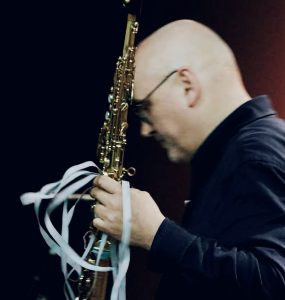
VLATKO KUČAN (DE) - reeds
Vlatko Kučan (b. 1963 Sarajevo, Ex-Yugoslavia) studied popular music, jazz and music therapy at the Hochschule für Musik und Theater in Hamburg.
He works as a musician (instruments: saxophones and clarinets), composer, producer, music therapist and educator.
His various works focus and explore the possibilities of artistic expression through the art of improvisation. They cross and extend traditional boundaries of contemporary music, jazz, improvised music, theatre and film music. Another focus of Kucan’s work is the combination of literature, philosophy and music. He also works as a director for radio plays and audio books.
He performed and collaborated with leading protagonists of contemporary jazz (i.e. Carla Bley, Lester Bowie, Anthony Braxton, Marion Brown, Bill Elgart, Dieter Glawischnig, Howard Johnson, Jay Oliver, Barre Philips, Tomasz Stanko, Steve Swallow, Kenny Wollesen) and improvised music (i.e. Derek Bailey, Malcolm Goldstein, Barry Guy, Aleksander Kolkowski, Jim Menesses, Rajesh Mehta, Lauren Newton, Maggie Nichols, Mia Zabelka).
His theatre collaborations include directors Karin Beier, Michael Bogdanov, Herbert Fritsch, Brian Michaels, Robert Wilson and musicians Tom Waits, Lester Bowie and Giora Feidman.
His works on literature and music include productions based on texts by Friedrich Nietzsche, Ludwig Wittgenstein, Charles Baudelaire, Anne Sexton and Mascha Kaleko and collaborations with various actors (i.e. Christian Brückner, Hannelore Elsner, Corinna Harfouch, Susanne Lothar, Dietmar Mues, Barbara Nüsse, Christian Redl, Lars Rudolph, Hanna Schygulla, Otto Sander, Ulrich Tukur, Ulrich Wildgruber) and authors (i.e. Peter Handke, Siri Hustvedt, Hellmuth Karasek, Siegfried Lenz, Benjamin Lebert, Helmut Schmidt).
Vlatko Kučan is teaching Improvisation at the Hochschule für Musik und Theater (HfMT) in Hamburg, Germany at the Jazz department BA and MA programs and the Contemporary Performance and Composition (CoPeCo) MA program. Since 2018 he is the head of the Social Performance, Interdisciplinary Improvisation and Creativity (SPIIC+) project, that is now part of the artistic research lab of the new ligeti center in Hamburg. He has been a visiting artist and lecturer and has held workshops on Improvisation at international academic institutions.
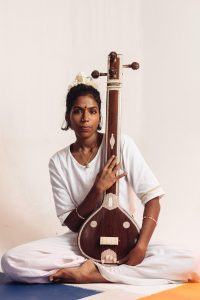
HANIA MARIAM LUTHUFI (LK) - voice
is a vocalist, composer and music educator from Colombo, Sri Lanka. Her interest in using the voice began with quirath (also spelled qirat) in her childhood, choral music in school; later, she moved to exploring and receiving informal training in jazz vocals. Hania is also a graduate of Calcutta University obtaining a Master's degree in Hindustani classical music and a Bachelor's degree at Viswa Bharati University in Santiniketan and stayed on in Bengal for five more years to study under the apprenticeship of her former teacher Shantanu Bhattacharyya. Luthufi's recent work comprises of abstract, cinematic compositions exploring the vast possibilities of drone music.
Her last album invited a gathering of musicians from disparate coastal regions to come together and musically interpret various temperaments of the sea. At present she is working on an EP of Raga music as digital and visual interpretations. This body of work is being done as her current research as a resident of Cité internationale des arts in Paris, where she is based at the moment.
Hania is also researching dialects of Arabic and Tamil through archiving lost devotional songs from fishing communities in the coastal regions of Sri Lanka. More recently, Hania’s works were a part of ‘Sea Change’, Colomboscope 2019, curated by Natasha Ginwala. She has also contributed to ‘Held Apart Together’, a digital program for Colomboscope 2021, Chobi Mela Festival in Bangladesh in 2021 and Colomboscope "Language is Migrant" 2022.
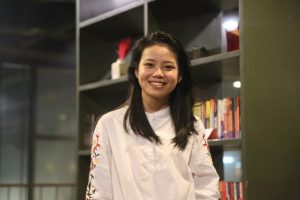
TAM THI PHAM (VN) - dan bau
is a Vietnamese multimedia composer, improviser and performer living in Hamburg. She completed her Bachelor of Musicology at the Vietnam National Academy of Music, a program in New Compositional Techniques at the University of Music and Theater Hamburg with Prof. Helmut Erdmann and is currently enrolled in Master in Multimedia Composition with Prof. Dr. Georg Hajdu, Prof. Dr. Gordon Kampe and Prof. Dr. Alexander Schubert.
Her works are a journey of exploring individuality in an attempt to connect with the surrounding social environment. She is trying to build a way of expression in which music and performance are two indivisible parts.
Tam Thi Pham plays electronic music, objects and Dan Bau (traditional Vietnamese instrument). One of her main interests is working with choreographers and dancers both as an improviser and as a composer. One aspect of this made networked music performance a focus of her current works (2020-), with the “2×2 WindowS” project (a collaboration with Japanese dancer Minori Sumiyoshiyama) garnering a lot of attention in Asia (Japan, Vietnam, Indonesia) and her “here&there” project being awarded funding and support from Goethe Institute in Hanoi. Another big interest of Tam Thi Pham lies in microtonal music, which she sees as both an expressive element and a research tool, helping her immerse herself into the rich culture of traditional Vietnamese music and transform it into a new, contemporary language and forms.
Besides her activities as a composer and a performer, she was also very active as an organizer of various discussions on contemporary music and art and concerts in Hanoi and Hamburg. She has also been participating at festivals in Vietnam, Germany, Japan, Indonesia and Serbia. such as: “Hanoi Sound Stuff Festival”, Hanoi, 2014; “Hanoi New Music Festival”, Hanoi, 2013 and 2018; “Beyond Sound” – a series of concerts of experimental music, Heritage space, Hanoi; 2016, 2017 and 2018; “Dance and music camp” with composer Heine Goebbels, Hanoi 2018; “New Music Festival”, Lüneburg, 2016, 2018 – 2021; “Blurred edges” festival, Hamburg, 2019, 2021; “41. International study week for contemporary music”, Hamburg, 2019 ; “next_generation 8.0 and 8.5” festival, Karlsruhe, 2019 and 2021; “Dance fest” Hanoi, 2019; “46.New Music Festival-Portrait Concert: Tam Thi Pham” at HfMT, Hamburg, 2020; Misch Masch festival, NPO Dance Box, Japan 2021; Exhibition “Zemljišta: situacije i dokumenta” (EN: “Grounds: situations and documents) at Gallery ”Jovan Popović” in Opovo, Serbia, 2021; “here&there” in reconnect – program of Goethe Institute in Hanoi, 2021; TAOI/ II, 2019 and TAOI (The Art of Improvisation) 2021..., Indonesian Dance festival (2021)
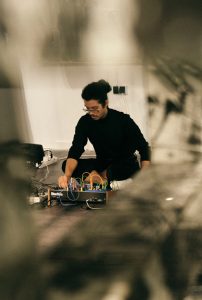
MATHEUS SOUZA (BR) - electronics
is a composer, improviser and performer from Rio (Brazil). His musical practice is focused on the field of electroacoustic music by carrying out live electronics, acousmatic, and mixed music pieces. In his artistic process he aims to develop dynamic and powerful yet elegant works. As an electronic musician, he performs on a set made up of a Buchla Easel Command and a laptop (Max or VCV Rack), searching for a balance between analogue and digital interfaces.
Holding a Bachelors degree in Music from Instituto Villa-Lobos - UNIRIO, he currently pursues a Masters degree in Contemporary Performance and Composition at the CNSMD de Lyon, under supervision of Michele Tadini and Jean Geoffroy. During the same Masters studies, as an Erasmus+ student at the Estonian Academy of Music and Theatre, he was guided in Contemporary Composition by Helena Tulve and he was an active student in a masterclass taught by Chaya Czernowin.
In the role of an artistic researcher, he focus his studies on both fields of Theory and Analysis of Electroacoustic Music and on Composition and Performance on Modular Electronic Instruments. In his Master Thesis he carries out an investigation on an interdisciplinary relationship between the theory and analysis of electroacoustic music and philosophy via three concepts: the Praxis according to Paulo Freire, the Semiotic Tripartite Theory by Jean Molino and Jean-Jacques Nattiez, and the Combination of Aural and Mimetic discourses by Simon Emmerson. The studies presented in this dissertation are implemented in his live electronic music work "Tekoha".
In March 2024, Matheus Souza was in an Artistic in Residency in Erica Synths HQ, in Riga, Latvia. In the residency he worked on some of their modular systems such as their Erica Synths system and their DIY Buchla 200. He investigated relationships between the Buchla and Erica Synths, that resulted in a new live electronics piece and several recordings of free-improvisations. On March 28th, 2024, Matheus Souza performed "Plasma" at Erica Synths Garage, as a restitution of the residency.
His debut album titled "Terra" was released on Bandcamp on November 2023. It is made up of a a 34-minute solo work in two parts, recorded and performed by himself in one take, each part. The work was composed by Matheus Souza for the Buchla 200/200e system from the Royal College of Music in Stockholm.
He contributed as a composer-performer to the Buchlaïsms series, produced by the electronic music platform "Modulisme" by Philippe Petit. For that he composed a 15' acousmatic work having as sound source his Buchla 208c processed via a Max/MSP patch he programmed. In this series, more then 100 electronic musicians pay tribute to the anniversaries of the Buchla 100 and Buchla Music Easel, released in 1963 and 1973, respectively.
https://garage.ericasynths.lv/articles/matheus-souza-bridging-classical-and-electronic/
Music in the Global Village Edition 2: Transcoding
Registered ArtSearch Participants will pay a reduced entrance fee of 5€
Satellite-Event
Büro für Problematische Komposition & guest present
Music in the Global Village Edition 2: Transcoding
Program
Inflating Stuff (2024)
Denisa Pubalova and Dr. Lea Luka Sikau
20,000 beats under the chest (2024)
Greg Beller
A capacity to be alone (2024)
Stefan Troschka
Silent Architects (2024)
Aigerim Seilova
Listening with the Heart (2024)
Xiao Fu: Listening with the Heart (2024)
Három Weöres-dal (1946 - 1947)
György Ligeti: Három Weöres-dal (1946 - 1947)
Büro für Problematische Komposition & guest present
Music in the Global Village Edition 2: Transcoding
Founded in Hamburg in 2019, the Büro für Problematische Komposition is a collective of multimedia composers, musicians, and video artists. Taking risks, experimenting, and placing the act of experimentation at the center of their creative process is the core approach for all members of the collective. Given the complexity of today's world, this year’s theme is "Transcoding": an artistic exploration of the translation between global and local codes. In addition to experimentation, communication and exchange are fundamental elements of our collective’s work. This is why we invite new composers and performers every year to join our endeavor.
Alongside the collective’s core members, multimedia composers Aigerim Seilova (KAZ), Greg Beller (FR), Stefan Troschka (DE), and Xiao Fu (CN), we are pleased to welcome several guest artists this time: composer Farzia Fallah (IRN), Michael Heupel (GR) on cello, Stephan Krause (DE) on percussion, Hsiang Hsiang Tsai (TWN) on viola, João Vargas (PRT) on double bass, and Ariane Stamatescu (DE) as a video artist.
Framing the event between contemporary music and media art is a performance by Dr. Lea Luka Sikau (DE) and Denisa Půbalová (CZ). As artist-researchers, they have been exploring the corporeality of the intestine and its acoustic communication with other organs for the past two years. As Artists-in-Residence at the Ligeti Center, they have spent over three months working on an inflatable installation called "stuff change," which examines metabolic sounds and their collective synchronization.
During the claustrophobic navigation inside the milky sculpture and the noisy inflation process, a performance emerged, embodying this process. The artist-researchers describe it as follows:
"Over the course of weeks, we inflated the sculpture you noticed just seconds before reading this. Sitting inside, we stuffed our ears and — after hours of noiseful humdrum — we started to sound ourselves. The byproduct of our process modulated airtight corporeality through bone-conducted overtones. Then we stopped, and all that remained were our metabolic acoustics.”
Program Notes:
artists
Büro für problematische Komposition// Greg Beller
Xiao Fu
Aigerim Seilova Stefan Troschka
guests
Farzia Falla // Composition
Stephan Krause // Percussion
Michael Heupel // Cello
Denisa Půbalová // Media Art
Lea Luka Sikau // Mezzo-soprano / Media Art
Hsiang Hsiang Tsai // Viola
Ariane Stamatescu // Visuals
João Vargas // Double Bass
Denisa Pubalova and Dr. Lea Luka Sikau: Inflating Stuff (2024)
Over the course of weeks, we inflated the sculpture you noticed just seconds before reading this. Sitting inside, we stuffed our ears and - after hours of noiseful humdrum - we started to sound ourselves. The side product of our process modulated airtight corporeality via bone-conducted overtones. Then we were done and the sound meandered.
Greg Beller: 20,000 beats under the chest (2024)
Performance:
Heart rate has natural fluctuations that are typically ascribed to autonomic function. Recent evidence suggests that conscious processing can affect the timing of the heartbeat [Conscious processing of narrative stimuli synchronizes heart rate between individuals, Pérez, Pauline et al., Cell Reports, Volume 36, Issue 11, 2021]. We hypothesize that musical stimuli can synchronize fluctuations of heart rate between individuals.
Can the phenomenon of clock sympathy observed by Huygens, capable of synchronizing the 100 metronomes of Ligeti's symphonic poem if they rest on the same support, move the hearts of those taking part in the same musical story?
The experimental set-up features a musical improvisation of Stephan Krause on the theme of hyper-attention, on an instrument driven by the heartbeats of two members of the audience.
Stefan Troschka: A capacity to be alone (2024)
for objects and live electronics
A key condition for creative thinking and acting is the ability to be alone. On a table in front of the percussionist are an egg slicer, a juggling ball, a camera, a cymbal, a brush and a spring.
Aigerim Seilova: Silent Architects (2024)
for Percussion, Electronics, and Video
Inspired by Gabriel García Márquez's conviction that "human beings are not born once and for all on the day their mothers give birth to them, but . . . life obliges them over and over again to give birth to themselves," explores the fascination and wonder of untouched curiosity.
Xiao Fu: Listening with the Heart (2024)
for cello, piano, fixed media and video
This piece explores the deep connection between auditory perception and emotional resonance. The composition begins with a processed heartbeat sound, reflecting the complexity of human emotions. This piece aims to transcend traditional auditory boundaries, encouraging the audience to listen not only with their ears but also with their hearts.“
Farzia Fallah: A Boundless Feast (2021) for viola, cello, double bass and percussion
In his book A Moveable Feast, Ernest Hemingway writes about his time in Paris as a young author. Back then in Tehran, I read a wonderful Persian translation of the book titled Paris, a Boundless Feast.
I wrote this piece during a three-month residency in Venice. A couple of times, I visited San Michele, the cementery island of Venice, where Luigi Nono and Igor Strawinsky are buried. There was an incredible calm there. Walking around, I heard cicadas from tree to tree, like a microtonal sound installation moving through space. I thought of the triangle sounds in Nono’s piece A Carlo Scarpa, architetto, ai suoi infiniti possibili. It was like a boundless feast.
György Ligeti: Három Weöres-dal (1946 - 1947)
No. 2 Gyümölcs-fürt (Fruchttraube / A Cluster of fruit)
Three Songs based on texts by Sándor Weöres for Voice and Piano
Artist Biographies:
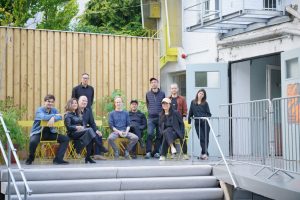
büro für Problematische Komposition
[Collective of Multimedia Composers, Musicians, and Video Artists]:
Aigerim Seilova is a composer and media artist with a focus on interdisciplinary work. Born in Kazakhstan, she studied composition at the Moscow State Tchaikovsky Conservatory and continued her education at the University of Music and Theater Hamburg. Her compositions blend traditional instruments with electronics and audiovisual media. Her works have been performed at events such as the Schleswig-Holstein Music Festival and the Chelsea Music Festival. Her operas *Shibboleth* (2021) and *I, Electra* (2023) exemplify her cross-media approach. Seilova is an alumna of the Akademie Musiktheater heute, was a Composition Fellow at the Tanglewood Music Center, and received the Hindemith Prize.
[https://www.aigerimseilova.com]
Greg Beller is an artist, researcher, teacher, and computer designer for contemporary arts. As the founder of the Synekine project, he invents new musical instruments that combine sound and movement, which he uses in improvisational settings with various artists or in computer-assisted composition, notably in his opera *The Fault*. At the Ligeti Center, he is preparing a second doctorate on "Natural Interfaces for Computer Music." He is a research associate at the Innovation Lab and teaches multimedia composition at the University of Music and Theater Hamburg. Between art and science, at IRCAM, he was a PhD student working on generative models of expressivity and their application in speech and music, a computer music designer, head of interface research/creation, and product manager of the IRCAM Forum.
[http://www.gregbeller.com]
Stefan Troschka (b. 1986) is a sound artist and multimedia composer based in Hamburg. His works explore the relationships between auditory and visual spaces. His installations and pieces can be understood as stagings of experimental setups that simulate, exaggerate, and reinterpret spatial perceptions.
[https://www.stefantroschka.de]
Xiao Fu holds her master and Dr. degree from the Hamburg University of Music and Drama in Germany and is the co-founder of the Cooltur Connect e.V., which brings together a new generation of artists from electronic, contemporary, Jazz, improv and folk music fields around the world. Under the label "fresh::sounds", Xiao organizes concerts in the Hamburg metropolitan region, for example the concert series "Music of the Silk Road", the two-year exchange project "W-burg" or "Music in the Global Village". In the field of acoustic and electronic music she is especially engaged in gesture control of instruments and interactive performance.
[http://www.fuxiao.de]
///////
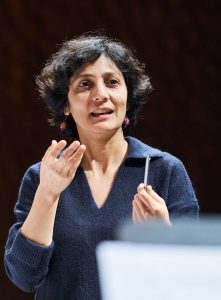
Farzia Fallah - Composer
born in 1980 in Tehran, currently works freelance in Cologne and collaborates internationally with various ensembles, musicians, and orchestras. Her latest orchestral work was premiered by the WDR Symphony Orchestra at this year’s Wittener Tage für neue Kammermusik. Her artistic career has been supported by numerous awards and scholarships. In 2023, she received the Heidelberg Female Artist Award and the German Composers' Award from GEMA in the Newcomer category. A portrait CD of her work was released by WERGO in 2024 as part of the Edition Zeitgenössische Musik series.
[www.farziafallah.com]
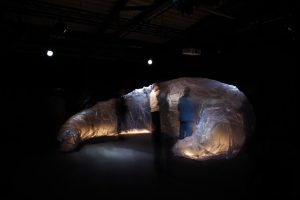
Denisa Pubalova and Dr. Lea Luka Sikau - Media Art
They have been collaborating as a duo since 2020, exploring the intersection of media art and experimental sound theater. This summer, they were resident artists and researchers at the Ligeti Center Hamburg. Dr. Lea Luka Sikau holds a PhD in Posthumanism, New Opera, and Rehearsal Ethnography from the University of Cambridge. As a media artist and director, her work focuses on post-anthropocentric approaches, and she has collaborated with artists such as Romeo Castellucci, Marina Abramović, and Rimini Protokoll. She is currently the curator for sound art and music at ZKM. **Denisa Pubalova** is a media artist, researcher in environmental philosophy, critical posthumanism, and technological infrastructures, and a creative programmer with a passion for interspecies communication and post-anthropocentric narratives. Their work has been commissioned by Ars Electronica, IMPAKT Utrecht, transmediale Berlin, Ensemble Modern, TONALi Hamburg, and the Ligeti Center Hamburg.
[http://www.leasikau.com] [https://www.behance.net/denisapbalov]
Ariane Stamatescu - Visual
is a freelance set and costume designer based in Berlin. She studied set and costume design at the Dresden University of Fine Arts and scenography at the École nationale supérieure des Arts Décoratifs in Paris. After her studies, she worked as an assistant set designer at the Deutsche Oper Berlin and as a designer for projects at Tischlerei, including for the Junge Deutsche Oper. Since then, her work has taken her to the Semperoper Dresden and to a research fellowship at HTW Berlin, where she developed an augmented reality app. She is an alumna of the Akademie Musiktheater heute in the field of set and costume design.
[www.ariane-stamatescu.com]
Michael Heupel - Cello
Michael is a sought-after soloist and chamber musician. His dynamic approach to music-making and creative programming has lead to performances in prestigious halls all over the world, such as the Athens Megaron, the Elbphilharmonie and the Laeiszhalle in Hamburg, the Carnegie Hall in New York, the Cadillac Shanghai Concert Hall, the Caroline H. Hume Concert Hall in San Francisco, the Cuvilliés Theater in Munich, the Onassis Cultural Center in Athens. He has been invited to perform in international music festivals and concert series like the Klub Katarakt festival for experimental music in Hamburg, the Athens and Epidaurus Festival, the “FULL” concert series by the BAMPFA in San Francisco California, the Euro Music Festival and the “Music connects the OCC and the Panteion University” concert series in Athens.
Stephan Krause - Percussion
After studying percussion at the Hamburg University of Music, Stephan Krause founded the percussion quartet *ElbtonalPercussion* in 1996. With the group, he has performed in Europe, Asia, and South America, produced 10 CDs and three DVDs, and collaborated with artists such as Sofia Gubaidulina, John Neumeier's Hamburg Ballet, Matthew Herbert, Hauschka, and the NDR Big Band. Since 2004, Stephan Krause has increasingly worked as a theater musician at various theaters, including the Thalia Theater and the Deutsches Schauspielhaus in Hamburg. In 2022, he took up a professorship for percussion and drums at the University of Music and Theater Hamburg.
[https://www.stephankrause.net/]
Hsiang Hsiang Tsai - Viola
Born in Taiwan, violist Hsiang Hsiang Tsai completed her Bachelor's degree in her home country and came to Germany in 2016 for her Master's at the State University of Music and Performing Arts Stuttgart, studying with Prof. Gunter Teuffel, graduating with distinction. Since 2019, she has been pursuing her Concert Exam in Stuttgart and plays the "Friedrich Chaudiere Viola" from the Chimei Foundation Taiwan.
She has attended masterclasses with Nobuko Imai, Garth Knox, Hans Peter Ochsenhofer, Roberto Diaz, and Maxim Rysanov, and received chamber music instruction from members of the American Quartet and Diotima Quartet. Hsiang Hsiang Tsai has performed with renowned festival orchestras, such as the Pacific Music Festival and Seiji Ozawa Music Festival in Japan. As a guest, she has played with orchestras such as the Luxembourg Philharmonic Orchestra, the Komische Oper Berlin, and was an academician at the Konzerthausorchester Berlin from 2017 to 2019. Since 2019, she has been a member of the Symphoniker Hamburg.
João Vargas - Double Bass
Born in 1996, João Vargas started playing the double bass at the age of six. He studied with Pedro Wallenstein and Romeu Santos at the Conservatório da Metropolitana de Lisboa and later with Manuel Rego at the Escola Superior de Música de Lisboa. In the summer of 2020, he completed his Master's degree in Performance at Codarts Rotterdam with Luis Cabrera.
He has played in several professional and youth orchestras, including Jovem Orquestra Portuguesa, Joven Orquesta Nacional de España, Orchestre des Jeunes de la Méditerranée, Jong Metropole, Nationaal Jeugd Orkest, Orquestra Metropolitana de Lisboa, Orquestra Gulbenkian, Orquestra Câmara Portuguesa, Orchester XXI, Orchestre de Picardie, and Nederlands Philharmonisch Orkest. He was a member of the European Union Youth Orchestra and participated in the Ferrara Chamber Academy in September 2019, where he performed a chamber music version of Mahler's Symphony No. 1 with other EUYO members and two tutors from the Chamber Orchestra of Europe.
João has taught at JOP (July 2020) and the NDR Youth Orchestra (September 2021)
Saturday October 26
9th floor | Conference Room
9:30am Coffee
//
10am Paper session 4 | Conference Room
10am: Fausto Lessa Pizzol
Defy Gravity: Navigating Constraints and Creative Opportunities of Performing in a Bass and Vocal Duo
Defy Gravity is an artistic research project that offers a self-reflexive analysis of the experimental processes involved in arranging, performing, and recording music for a bass and vocal duo—an ensemble that challenges conventional musical configurations. Grounded in the ecological approach to perception, which emphasizes the interaction between the performer and their environment, this study examines how the theoretical principles and processes of this branch of psychology can open pathways to explore creative possibilities and cultivate a distinctive artistic ‘voice’.
By examining three recorded performances by the duo, approached as detailed case studies, this study clarifies the dynamic interplay between creative intuition and technical proficiency, revealing how these elements converge to define the artistic output. The discussion is centered on three key areas: [1] the perceptual learning of affordances (Gibson & Pick, 2000), interpreted as the detection and refinement of action possibilities within the duo ensemble environment; [2] enskilment (Ingold, 2000), contextualizing the gradual development and embodiment of skills within this unique musical setting; and [3] the role of assemblage (Assis, 2018), illustrating how diverse materials and practices coalesce during the processes of arranging and rehearsing.
Ultimately, this study offers a comprehensive exploration of the theoretical framework of the ecological approach to perception as applied to music performance practices. It provides insights into navigating the tension between artistic expression and technical execution, striving to transcend the metaphorical 'gravitational pull' that draws performers back to conventional practices. By doing so, it seeks to redefine the creative possibilities within this unique ensemble while creating an experimental pathway for developing an original artistic voice.
Fausto Lessa F. Pizzol is a musician with over 25 years of experience as a bassist and double bassist, working as a performer, arranger, and composer. He holds a Ph.D. in Music from the University of Aveiro, where he specialized in Music Performance and dedicated himself to Artistic Research. His current research focuses on applying the principles of Ecological Psychology to foster creative and technical development in musical performance. In 2024, he released his first solo album, featuring original compositions inspired by his research on the polyphonic potential of the electric bass, exploring its creative possibilities in innovative ways.
10:25am: Benjamin Scheuer
Georges Aperghis' Thinking Things: Robotics and AI as inspiration for music theater
In the artistic mindset of Greek-French composer Georges Aperghis, music and theater are so closely intertwined that the boundaries between music theater and concert music are sometimes blurred. In his théâtre musical, the audience goes on a wild journey, somewhere between entertainment and irritation. From 2000 onwards he created an elaborate music theatre trilogy in cooperation with IRCAM, which dealt with the digital age. The final part and highlight is the multimedia spectacle Thinking Things (2018), in which, in addition to four performers, video and electronics, robotic applications provided by INRIA are incorporated. The piece is not based on a classic narrative, but rather touches on various topics in a collage-like form, such as warfare with drones, robotic extensions of the body and ethical standpoints on robotics and artificial intelligence. The key question of this study is what role robotics and AI played during the artistic and technological development of the music theater. What artistic and technical means were used to create text fragments, videos and, above all, the electronics of the composition?
In addition to an analysis of the performance video, interviews have been led with members of the artistic team. There are indications that the technically highly complex multimedia spectacle contains references to the scopophilia of early cinema performances and other forms of popular entertainment. As in a life-size puppet theater, the presented robotic extensions are “brought to life” while the human actors are mostly presented in excerpts and demonstrate behavior similar to puppets.
In order for Thinking Things to work as a scopophilic spectacle, Aperghis skillfully constructs contradictions by confronting technology and rationality with the world of magic and the mysterious. Aperghis warns against unreflective belief in progress and technology fetishism. By juxtaposing archaic ritual and cutting-edge innovation, the criticism becomes apparent without him directly articulating it and while always maintaining a playful lightness.
Benjamin Scheuer is a freelance composer. He studied composition in Hamburg (diploma 2011) and Karlsruhe (soloist exam 2014) with Dieter Mack, Fredrik Schwenk and Wolfgang Rihm. In 2023, he completed his doctorate at the Freiburg University of Music under Janina Klassen with a thesis on music theatricality in the work of Georges Aperghis. His compositions are performed every year in various countries and by renowned ensembles. He has been awarded the Bach Prize Scholarship of the City of Hamburg, the Busoni Prize of the Akademie der Künste Berlin and the Schneider-Schott Music Prize of the City of Mainz, among others. He won the Basel Composition Competition 2019 with his orchestral piece “versungen” and the Composition Prize of the City of Stuttgart 2021 with “Acht Arten zu Atmen” for accordion and clarinet. As a founding member of Musiker ohne Grenzen e.V., he regularly traveled to Ecuador, where he gave music lessons to disadvantaged young people. He currently teaches at the music academies in Trossingen and Mainz.
10:50pm: The Gut Rehearses to Tell You Something: Artistic Research Processing Intestines
Pre-birth, you hear bowel sounds from the uterus. Post birth, you emit and hear bowel sounds, now transmitted through air instead of bodily fluids. The acoustic utterance of our gut navigates us through todays’s world, from gut feelings states to the hypes of microbiomes and GutTok. However, our guts remain hushed and stigmatized in Europe today.
In this paper, we propose to listen to the queer form and its multi-organ communication via introducing the research process behind one of our latest sound art works. Commissioned by the Ligeti Zentrum and S+T+ARTS ReSilence, stuff change / látková přeměna is a multi-sensory installation exploring the acoustic and haptic quality of the gut. It brings our guts into collective resonances and viscerally encourages them to synchronize with each other. stuff change / látková přeměna sounds out how we can attune to one another, not via breath or heartbeat, but through our gastrointestinal systems - asking to get closer to yourself, think outside your own rationality and to experience your body as an ecological system.
In an inflatable bath of sounds, the audience’s gut sounds are experimented with and woven into a composition - or gutscape - that affects our internal organs and nurtures multi-organ communication. Beyond semantics, this space enmeshes sounds with intuition, opening up to the hidden interplay of collective subconscious processes, affects and decision making that define our gut feeling. The paper will delve into the process of researching and co-creating acoustic ecologies of the intestines enmeshed with medical histories and affective aesthetics. In its circulating characteristics, the sonic workings of the gut serve as a starting point and outlook to rethink the way we listen from our womb-becoming.
Denisa Pubalova and Dr. Lea Luka Sikau have worked in a duo since 2020, exploring the intersection of media arts and experimental sound theater. This summer, they were artist-researchers in residence at Ligeti Center Hamburg. Dr. Lea Luka Sikau is an artist-researcher with a PhD on posthumanism, new opera and rehearsal ethnography from the University of Cambridge. As a media artist and stage director, she focuses on post-Anthropocentrism, having worked with artists such as Romeo Castellucci, Marina Abramović, and Rimini Protokoll. Currently, she is the curator for sound art and music at the ZKM. Denisa Pubalova is a media artist, a researcher on environmental philosophy, critical posthumanism, and technological infrastructures, and a creative coder fascinated by interspecies communication and post-anthropocentric narratives. They have been commissioned by Ars Electronica, IMPAKT Utrecht, transmediale Berlin, Ensemble Modern, TONALi Hamburg, and ligeti zenter Hamburg.
11:15pm: Miriam Akkermann
From Generative to Artificial? Observing Music Creation Processes
The new Artificial intelligence (AI) tools and the developments in machine learning (ML) promise now seemingly effortless sound and music creation. They are, however, not the first tools to help creating music, and also the use of these developments has not always been as simple as it may appear. I want to draw attention to the music creation processes and discuss the questions: What do we expect from the tools? What music is generated? What artistic knowledge do we think is embedded in these generative processes? And what can we learn from the results?
Miriam Akkermann is musicologist and sound artist. She received a PhD in musicology from the Berlin University of the Arts, and completed her habilitation at Bayreuth University. Her research areas include music of the 20th and 21st century, computer music and music technology, digital musicology, musical performance practices and archiving music. A special emphasis lies on examining the intersection of music research and artistic practice. Within the framework of “Lullabyte,” the researches focus is set on the effect of music on sleep.
Since April 2024, she holds the Ernst-von-Siemens endowed professorship for new music at FU Berlin.
11:50pm: Lorenzo di Romano
Rework: Embedding the Creative Processes of Remix in the Chamber Opera La Luna
This paper, based on my dissertation Rework: Embedding the Creative Processes of Remix in the Chamber Opera La Luna, delves into Remix Theory and the development of my Reworking Method of analysis. It presents a practical framework for applying remix culture principles in contemporary music composition, focusing on how existing music can be reworked as a compositional tool through Remix. I introduce Remix Theory as the primary lens for analyzing my compositional process, extending beyond sampling to view the entire composition as cultural citation and transformation.
The paper also examines musical borrowing in classical Western music, categorizing techniques used by composers to engage with pre-existing materials. I expand these methods into remix culture by incorporating appropriation, selectivity, bricolage, and deconstruction, creating a new compositional approach. A key contribution is the Matrix of Appropriation and Transformation, a tool for analyzing how borrowed music can evolve into innovative works. This matrix is applied to La Luna, showcasing how remix strategies recontextualize sounds, yielding an original opera.
This research challenges traditional ideas of originality and authorship, offering composers new methods for creatively manipulating sound within my Reworking Method.
Lorenzo Romano (b. 1985, Florence) is an Italian composer based in Berlin. He studied contemporary history and music composition in Florence before pursuing further studies in instrumental and electronic composition at the Universität der Musik und darstellende Kunst Graz with Beat Furrer and Marko Ciciliani. Encounters with renowned composers like Salvatore Sciarrino and Helmut Lachenmann have had a significant impact on his musical style.
His compositions have been supported by institutions such as the Ernst von Siemens Musik Stiftung and Musikfonds, and he has won awards in international competitions. Romano’s works have been performed at prestigious festivals, including the Biennale di Venezia and Wien Modern, and by acclaimed ensembles such as Neue Vocalsolisten and Quartetto Prometeo.
Romano's music often explores the concepts of transcription and the integration of new technologies. In 2013, he co-founded the Schallfeld Ensemble, based in Graz, Austria. His opera La Luna premiered at the Hamburg State Opera in 2022, and in 2023, he earned his PhD with Summa cum Laude for his dissertation Rework: Embedding the Creative Processes of Remix in the Chamber Opera La Luna. In 2024, he taught instrumental composition at the Conservatory “Jacopo Tomadini” in Udine.
12:30pm Lunch break | kitchen/9th floor
//
4-5pm Final Round Table | conference room
//
All-day installation: Enrico Dorigatti | 9th floor
hyperobject::01
Modern technology exists as a hyperobject; it is immensely vast and complex—the sheer scale of it exceeds our ability to ever fully comprehend its complexity. It is all-pervading and in constant proliferation, encompassing vast networks of devices, software, and digital infrastructures that underpin our modern world.
Through the interaction of abstract imagery and sounds rooted within the post-digital and glitch aesthetics, and realised through generative and algorithmic techniques, hyperobject::01 aims to explore our understanding of this complex phenomenon—our limits of reality and human perception with complex concepts such as data—inviting the audience to contemplate and reflect on the vastness of the world we inhabit and our place within it, both physically and metaphorically, as technology becomes every day more ubiquitous and irreplaceable.

Enrico is a sound artist and creative technologist working across different formats. He is especially interested in the artistic exploration of indeterminism, audio-visual interaction, generative systems, and shared agency between humans and machines. He is a conservatory graduate in electroacoustic music composition (BA and MA). Hi artistic and scholarly output has been presented internationally.
Workshop: 10th floor | Production Lab
2-3:30pm Workshop 3: Zander Porter
Transindividual Equations/Matrices: Schizoid Therapeutics for a Post-neoliberal Cyber-worlding
Zander Porter invites participants from across spectra of movement, (dis)ability, and (dis)embodiment curiosity/experience to explore emoting exercises, cyborg mirroring, and replicant (dis)identification together. Through guided psychosomatic micro-ceremonies, the group will explore feeling (or emoting), articulating, seeing, and facializing in relation to each other and each other’s devices, virtually and corporeally. This intimate workshop aims to construct and experience an “identity blip matrix,” complicating neurotypical relationality and reorienting notions such as I/you/eye, we/techno/us, other/consumption/individual, queer/here/when, and this/🥺🤓🤔😵💫/that.
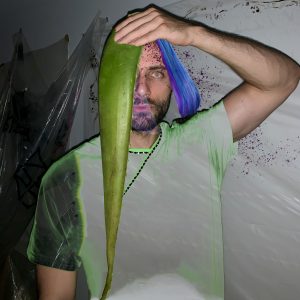
Zander Porter (ザンダー・ポーター) is a US-American artistic researcher and choreographer-cyborg based primarily in Berlin with additional frequencies in Los Angeles, Amsterdam, and Tokyo. Working between liveness and onlineness, ze interpolates (dis)identification and (dis)embodiment as phenomenological inquiries between surface, soma, portal, and psyche. Zander’s practices dissect and recompose attention and identity through gamification of gender, affect, interlocution, and subjectivity. Citing internet semiotics, hormonal technologies, corporeality, and surveillance paradigms with a mixture of curiosity, reverence, irony, and skepticism, Zander’s work critically exposes neoliberal orders of hyper-individualization and reimagines staged/documented ceremonies of the techno-social. Ze articulates byproducts (expressions, performativities) of this negotiation as (technogenetic, neuroatypical) matrices of queerer relationality.
Zander has been a core member of XenoEntities Network (XEN), a platform for discussion and experimentation focusing on intersections of queer, gender, and feminist studies with digital technologies. Holding a high-honors BA in Art Studio (with additional coursework in Computer Science and Performance Studies) from Wesleyan University and an MA in Choreography from DAS Graduate School – Amsterdam University of the Arts, ze has worked or participated in residencies at Swiss Institute / Contemporary Art (New York), Cité internationale des arts (Paris), Trauma Bar und Kino (Berlin), the Saison Foundation (Tokyo), National Institute for Space Research (São José dos Campos), and Leonardo@Djerassi (Woodside), alongside reception of disparate production and research grants or awards and participation in various exhibition and festival contexts internationally.
THE ART OF IMPROVISATION - TAOI 2024 II SOUND, LIGHT, DANCE
Registered ArtSearch Participants will pay a reduced entrance fee of 5€
Satellite-Event
THE ART OF IMPROVISATION - TAOI 2024 II
SOUND, LIGHT, DANCE
JEAN-CHARLES FRANÇOIS (FR) - percussion
GYÖRGY KURTÁG JR. (FR/HU) - electronics
KATRIN BETHGE (DE) - light artist
SUSANNE MARTIN (DE) - dance
KATARZYNA BRZEZINSKA (PL) - dance
NICOLA L. HEIN (DE) - guitar
JOHN ECKHARDT (DE) - double bass
TAM THI PHAM (VN) - dan bau
HANIA MARIAM LUTHUFI (LK) - voice
MATHEUS SOUZA (BR) - electronics
VLATKO KUČAN (DE) - host, saxophones, clarinets
On this second TAOI evening in 2024, we are looking forward to a world-class improvisation ensemble with whom we would like to build on our highly acclaimed trans-disciplinary concert TAOI 2022 II, which at the time had the motto: Sound, Dance, Words & Silk. This time, under the title: Sound, Light & Dance, the focus will be on the combination of contemporary music, dance and light art. We have succeeded in inviting some of today's most fascinating improvisation artists to Hamburg and to the stage of the Resonanzraum - while, of course, remaining true to our basic principle of always initiating creative encounters between different genres, traditions and generations with The Art of Improvisation.
Two 'old masters' of contemporary music will be joining us from France: percussionist Jean-Charles François (who we already welcomed as a guest in 2018) and, for the first time in Hamburg, French-Hungarian composer and sound researcher György Kurtag Jr.
The choreographers and dancers Susanne Martin and Katarzyna Brzezinska and the sound artist and guitarist Nicola L. Hein will be joining us from Berlin. Coming from Hamburg are the magnificent light artist Katrin Bethge, the exceptional bassist John Eckhardt and the wonderful dan-bau player Tam Thi Pham. Together with the Sri Lankan singer Hania Mariam Luthufi and the Brazilian electronics artist Matheus Souza, the latter will represent the young generation of improvisers on this evening. As always, TAOI's curator and host of the evening, saxophonist and clarinettist Vlatko Kučan, will of course also be taking part.
It should perhaps also be mentioned that, in addition to the enjoyment of artistic improvisation, all of the evening's protagonists share a common interest in its theoretical exploration - in the sense of academic artistic research. All those involved in this evening will participate in a two-day artistic research workshop that will take place at ligeti center Hamburg.
The 'results' of this collective artistic experience will therefore certainly flow into this evening.
And last-but-not-least, we are delighted that this evening will be part of the 10th anniversary of the Resonanzraum St. Pauli. Congratulations, we look back together on seven years of The Art of Improvisation in the Resonanzraum, thank you for the great collaboration - and we are looking forward to many more exciting evenings!
And, as always, we look forward to seeing you,
Vlatko Kučan
with the TAOI team & artists
Artist Biographies

JEAN-CHARLES FRANÇOIS (FR) - percussion
A composer and percussionist, Jean-Charles François studied at the CNSMD in Paris. He was a freelance percussionist in Paris during the 1960’s. He was involved with the Domaine musical and Musique vivante from 1962 to 1969;
Between 1965 and 1969, he was the co-director of the Centre de Musique, at the American Center in Paris, together with Keith Humble and Giuseppe Englert.
François went on to teach in the Music Department of the University of California at San Diego, where he became Chairman. In 1975, he founded the experimental music group, Kiva.
From 1990 to 2007, he was the director of the Cefedem Rhône-Alpes (a center devoted to the training of future music school teachers) in Lyon.
In 1994, he joined the Aleph Ensemble as a percussionist. In 2007, he founded the improvisation ensemble PFL Traject with musicians from Lyon. The author of numerous articles on music theory, he published Percussion and Contemporary Music in 1991 (Klincksieck, Paris). His doctoral thesis (Paris VIII University, 1993) is on “The creative performer”.
He is a member of the contemporary music ensemble Aleph, Paris, of PFL Traject, Lyon, and PaaLabRes collective.
www.ensemblealeph.com
www.paalabres.org

GYÖRGY KURTÁG JR. (FR/HU) - electronics
Composer, sound designer and improviser, he is since 2014, Arts/Sciences coordinator at the SCRIME computer music laboratory (University of Bordeaux - Science and Technology Department). This position enables him to link collaborative compositions and evolving scientific projects. In the past decades he has worked and performed in the most prestigious studios and concert halls around the world. (Ircam-Paris, Zkm - Karlsruhe; Guggenheim, New York; Carnegie Hall.
)
After completing his composition studies at the Frantz Liszt Academy in Budapest (Hungary), György Kurtàg joined the I.R.C.A.M team as a RIM, and composer-researcher (pedagogy dept and Instrumental Research Group). He has collaborated with some of most influential researchers in computer music field as Tod Machover (MIT Medialab, Futur Group), David Wessel (CNMAT Berkeley), George Lewis (The Center for Jazz Studies at Columbia University) as well as famous composers like Mauricio Kagel, Pierre Boulez, Sylvano Busotti, Péter Eötvös.
Deeply attracted to the visual arts, he has received musical commissions from the Centre Georges Pompidou, Musée du Louvre and Musée de Grenoble, as well as from visual artists, video artists and choreographers.
His research encompasses both collaborative compositions, evolving projects as well as the analysis and capture of the gestures of the instrumentalist, as well as the creation of new instruments. He is Artistic Director of SCRIME and President of the European Center FOR Improvisation.
« As a composer I am interested in collaborative work with composers, but also in evolving projects with performers. As a researcher, I am interested in the creation integrating both collective instruments and the pedagogy of expressive interactivity. As an improviser I experience a form of complexity that develops essential skills for the fluidity of a three-dimensional communication: Sensory intelligence (listening mobility, haptic perception, etc.) shared intelligence (human-machine communication), collective intelligence (free collective improvisation) » .
Records :
Face to face : Barre Phillips / Gyorgy Kurtag. (2022) ECM Records N°2735
Kurtagonals : (2008) ECM Records N°2097
Creation : moment’s Notice trio BMC Records CD 285
Zwiegespräch - Kurtag 80 : BMC Records CD 129
S(M)S : Lux Nox BMC Records CD 081
« The Well - Tempered Universe » SC.Art Fonogram-Hungary award)
https://youtu.be/rrKnFr8lxBc?si=sUbkqScq7Bx5wWxq
https://youtu.be/MJ8Z5skovLw?si=Bp_mQ7sJ9hhrt5Cd
https://youtu.be/FaUABVWc2pk?si=irSK8Qc9mGSoC6fb
https://youtu.be/M3Tr8mSDYl8?si=3xizzBPTGQ-FCU3L

KATRIN BETHGE (DE) - light artist
Katrin Bethge begann nach dem Studium der Illustration an der HAW Hamburg 1999 mit der Arbeit mit Licht. Ihre Overheadprojektionen begleiten Projekte aus den Bereichen Tanz, Theater, Musik und Installation. Im Duo mit dem Bassisten John Eckhardt ist sie bei internationalen Festivals eingeladen, und gemeinsam realisieren sie Licht- und Klanginstallationen. Beim Hauptsache Frei Festival Hamburg erhielt das Tanzprojekt restructuring mit Veronique Langlott und Alexandra Griess den Jurypreis. Für die Installation „Lichtreise“ im Schleswiger Dom, bekam Katrin Bethge den Kulturpreis der Stadt Schleswig verliehen. Das Ensemble Resonanz begleitete sie beim Funkelkonzert in der Elbphilharmonie Hamburg und das Ensemble Modern in Frankfurt bei einem On Air Konzert. Im Herbst 2021 leuchtet sie zum 200. Jubiläum die Uraufführung „Schattengold“ Konzerthaus Berlin. Ihre Lichtinstallationen waren bei der Luminale in Frankfurt, den EVI Lichtungen, Hildesheim, der Hafensafari Hamburg sowie dem Tag des offenen Denkmals in Hamburg zu sehen.
Die Projektionen von Katrin Bethge verwandeln als vergängliche Malerei die Oberflächen des Raumes, in den sie fallen. Lichtbrechende Objekte, Flüssigkeiten und alltägliche Materialien werden direkt auf der Arbeitsfläche des Projektors bewegt, wodurch kosmische wie mikroskopische Räume aus Licht entstehen.
http://katrinbethge.com

SUSANNE MARTIN (DE) - dance
is a Berlin-based choreographer, performer, researcher, and teacher in the field of contemporary dance and theatre. She presents her work internationally in solo performances and collaborative stage works. Her artistic practice and research focus on improvisation as choreographic practice, critical practices and narrations of age(ing), contact improvisation, artistic research methods, and improvisation-based approaches to learning, knowledge production and knowledge dissemination. Festivals that presented her performances include: International Dance and Theatre Festival (Gothenburg), Aerowaves (London), Nottdance (Nottingham), Opera Estate (Bassano del Grappa), Tanec Praha (Prague). Her PhD dissertation Dancing Age(ing): Rethinking Age(ing) in and through Improvisation Practice and Performance was published 2017 by transcript. In her postdoctoral research at EPFL, Switzerland (2018-2021) she examined dance improvisation in its potential to rethink and advance processes of learning, teaching and researching in a technical university.
Post navigation
https://www.susannemartin.de

KATARZYNA BRZEZINSKA (PL) - dance
was studying at the Academy of Fine Arts and Design in Wroclaw (PL); Contemporary Dance, Improvisation & Performance in Silkeborg (DK) and Freiburg (DE). She is a freelance artist/choreographer/movement researcher in the field of choreography, dance and performance as well as sculpture and installation. She creates her own projects, participates in cooperation with artists in an international context and offers workshops and classes in the field of Movement, CI, Experiential Anatomy, Somatic Performance & Embodied Choreography as well as Instant Composition Research. In years 2017-2020, she was involved in the "DAS TANZNETZ Freiburg"; in the organisation, realisation and artistic conception of event formats, such as workshops, residencies and research laboratories in the field of dance and performance. Since 2019 she works also as an Ilan Lev Method Practitioner and ILM Movement Teacher mainly with dancers, performers and choreographers. Since 2022 she collaborates as an ILM Practitioner with Sasha Waltz & Guests Company in Berlin. Since 2023 she works within a frame of “Smart Cities Inkubator” under Victoria Hochschule in Berlin on establishing the company “BACK to BODY”, working between choreography, science of movement & preventive medicine.
Her current artistic interests include the following themes:
• The science of spaces within embodied and site specific practices
• Magic of dreams; poetry and imagination in relation to tangible facts of reality, physical and anatomical structures, body flesh, objects, senses, perception, colours, spaces, shapes, etc.
• Layers of female identity in relation to the system, culture, nature, inner and outer experience and other people
• "perfect imperfection"; in the context of research on strength, power, will, challenge, weakness, trust, vulnerability
• Frame of reference "many in one"; and "one in many"; as well as artistic presence
https://www.brzezinska.space

NICOLA L. HEIN (DE) - guitar
is a sound artist, guitarist, composer and scholar, working in the field of music aesthetics and cybernetics.
He is a professor of Digital Creation at the Music University of Lübeck, Germany.
His work is driven by the interaction of sound and space, light, movement, thought and the becoming of embodied and intermedial intelligence in aesthetic systems, community and technology.
In his artistic work he uses physical and electronic extension of the electric guitar, sound installations, cybernetic human-machine interaction with A.I. interactive music systems, Augmented Reality, telematic real-time art, ambisonic sound projection, instrument building, conceptual compositions, inter-media works (w/video art, light, dance, literature) and much more.
In his work as a sound artist he builds installations, sculptures, instruments, researches the interaction of sound, material and space, works with field recordings, programs (intelligent) software systems, creates a multitude of intermedial works, engages in network technologies and artistically develops dances of agency between the human, nature and technology.
He explores the possibilities of the electric guitar as a modular becoming of technology and sound. In this process the guitar is played with objects, extended techniques, stratified by the use of analog and digital effects as well software programming and is understood and developed as a creator of space and interaction. The use of Artificial Intelligence/machine learning, ambisonic spatialization and the interaction with autonomous interactive music systems play a central role in his practice.
His research revolves around questions of philosophy of music, epistemology, aesthetics, media theory, critical improvisation studies and cybernetics. It follows questions of the creation of identity and sense in interactions between humans and technology, investigates the philosophical implications of musical and intermedial practices.
He studied Jazzguitar, Soundart/Composition, Philosophy and German philology at the Friedrich-Wilhelms Universität Bonn and the Gutenberg-Universität Mainz. He was invited twice as a visiting scholar at Columbia University, New York City (2017-2018, 2019-2020), working with Prof. George E. Lewis. Currently he is pursuing his Ph.D. in Music at Columbia University in New York.
His work has been shown internationally at institutions and festivals such as the Museo Arte Moderno (Medellín), Ludwig Museum (Budapest), Acht Brücken (Cologne), Moers festival, MaerzMusik (Berlin), Harvestworks (New York City), Ars Electronica (Linz), Mapping Festival (Geneva), Mirage Festival (Lyon), Experimental Intermedia (New York), Experimental Sound Studio (Chicago), Walcheturm (Zürich), Dark Circuits Festival (New York), Super Deluxe (Tokyo), Sonica (Glasgow), Klex Festival (Kuala Lumpur), Hong Kong New Music Ensemble (Hong Kong), NIME (Birmingham and Shanghai), Festival International de Cine (Mexico City).
https://nicolahein.com

JOHN ECKHARDT (DE) - double bass
Whether performing today’s most challenging double bass repertoire, developing his own music, or working sound systems with a bass guitar or a set of turntables - John Eckhardt is testing the limits of being a bassist on planet earth in the 21st century, working towards a broader vision of what bass always was and can become in the future.
Seeking to combine scope with depth, John Eckhardt is constantly involved in the creation of new music and has both collaborated with a wide spectrum of artists and created his personal brand of solo projects. He worked with many composers including Helmut Lachenmann and Pierre Boulez, top new music groups such as Ensemble Modern, Klangforum Wien and musikfabrik, improvisors from Evan Parker, Elliott Sharp, Peter Brötzmann and Peter Evans, to today’s new blood in a wide field of today’s music.
John Eckhardt has performed on over 40 recordings, among them six internationally acclaimed solo releases. These share an interest in low frequency and spectral immersion, spatial depth, and themes of repetition and evolutional process. They are regularly released as special one-of-a-kind art editions, which also present John Eckhardt’s deep interest in the practice of photography.
Driven by curiosity and passion for different styles, cultures and artistic means, John Eckhardt keeps drawing new connections and expands a bass cosmos of unusual dimensions. As Fatwires, he has been working on a personal brand of heavy, bass-guitar-based industrial dub in solo releases and collaborations. He has recently realized a series of sound installations, among them „48k“ which was first published by Touch Records and nominated for the German record critics award. After his most recent release „Palaeodubfolk“, performed entirely on found instruments, he is now working on a new solo set that draws heavily on themes of the double bass as a prototypical four-stringed string instrument across histories and traditions. In his Basswald DJ project John Eckhardt presents a diverse spectrum of bass music with a special ear for sound system culture, also listenable in over 30 editions of the Basswald podcast series.
https://www.johneckhardt.de

VLATKO KUČAN (DE) - reeds
Vlatko Kučan (b. 1963 Sarajevo, Ex-Yugoslavia) studied popular music, jazz and music therapy at the Hochschule für Musik und Theater in Hamburg.
He works as a musician (instruments: saxophones and clarinets), composer, producer, music therapist and educator.
His various works focus and explore the possibilities of artistic expression through the art of improvisation. They cross and extend traditional boundaries of contemporary music, jazz, improvised music, theatre and film music. Another focus of Kucan’s work is the combination of literature, philosophy and music. He also works as a director for radio plays and audio books.
He performed and collaborated with leading protagonists of contemporary jazz (i.e. Carla Bley, Lester Bowie, Anthony Braxton, Marion Brown, Bill Elgart, Dieter Glawischnig, Howard Johnson, Jay Oliver, Barre Philips, Tomasz Stanko, Steve Swallow, Kenny Wollesen) and improvised music (i.e. Derek Bailey, Malcolm Goldstein, Barry Guy, Aleksander Kolkowski, Jim Menesses, Rajesh Mehta, Lauren Newton, Maggie Nichols, Mia Zabelka).
His theatre collaborations include directors Karin Beier, Michael Bogdanov, Herbert Fritsch, Brian Michaels, Robert Wilson and musicians Tom Waits, Lester Bowie and Giora Feidman.
His works on literature and music include productions based on texts by Friedrich Nietzsche, Ludwig Wittgenstein, Charles Baudelaire, Anne Sexton and Mascha Kaleko and collaborations with various actors (i.e. Christian Brückner, Hannelore Elsner, Corinna Harfouch, Susanne Lothar, Dietmar Mues, Barbara Nüsse, Christian Redl, Lars Rudolph, Hanna Schygulla, Otto Sander, Ulrich Tukur, Ulrich Wildgruber) and authors (i.e. Peter Handke, Siri Hustvedt, Hellmuth Karasek, Siegfried Lenz, Benjamin Lebert, Helmut Schmidt).
Vlatko Kučan is teaching Improvisation at the Hochschule für Musik und Theater (HfMT) in Hamburg, Germany at the Jazz department BA and MA programs and the Contemporary Performance and Composition (CoPeCo) MA program. Since 2018 he is the head of the Social Performance, Interdisciplinary Improvisation and Creativity (SPIIC+) project, that is now part of the artistic research lab of the new ligeti center in Hamburg. He has been a visiting artist and lecturer and has held workshops on Improvisation at international academic institutions.
https://www.vlatkokucan.de/

HANIA MARIAM LUTHUFI (LK) - voice
is a vocalist, composer and music educator from Colombo, Sri Lanka. Her interest in using the voice began with quirath (also spelled qirat) in her childhood, choral music in school; later, she moved to exploring and receiving informal training in jazz vocals. Hania is also a graduate of Calcutta University obtaining a Master's degree in Hindustani classical music and a Bachelor's degree at Viswa Bharati University in Santiniketan and stayed on in Bengal for five more years to study under the apprenticeship of her former teacher Shantanu Bhattacharyya. Luthufi's recent work comprises of abstract, cinematic compositions exploring the vast possibilities of drone music.
Her last album invited a gathering of musicians from disparate coastal regions to come together and musically interpret various temperaments of the sea. At present she is working on an EP of Raga music as digital and visual interpretations. This body of work is being done as her current research as a resident of Cité internationale des arts in Paris, where she is based at the moment.
Hania is also researching dialects of Arabic and Tamil through archiving lost devotional songs from fishing communities in the coastal regions of Sri Lanka. More recently, Hania’s works were a part of ‘Sea Change’, Colomboscope 2019, curated by Natasha Ginwala. She has also contributed to ‘Held Apart Together’, a digital program for Colomboscope 2021, Chobi Mela Festival in Bangladesh in 2021 and Colomboscope "Language is Migrant" 2022.

TAM THI PHAM (VN) - dan bau
is a Vietnamese multimedia composer, improviser and performer living in Hamburg. She completed her Bachelor of Musicology at the Vietnam National Academy of Music, a program in New Compositional Techniques at the University of Music and Theater Hamburg with Prof. Helmut Erdmann and is currently enrolled in Master in Multimedia Composition with Prof. Dr. Georg Hajdu, Prof. Dr. Gordon Kampe and Prof. Dr. Alexander Schubert.
Her works are a journey of exploring individuality in an attempt to connect with the surrounding social environment. She is trying to build a way of expression in which music and performance are two indivisible parts.
Tam Thi Pham plays electronic music, objects and Dan Bau (traditional Vietnamese instrument). One of her main interests is working with choreographers and dancers both as an improviser and as a composer. One aspect of this made networked music performance a focus of her current works (2020-), with the “2×2 WindowS” project (a collaboration with Japanese dancer Minori Sumiyoshiyama) garnering a lot of attention in Asia (Japan, Vietnam, Indonesia) and her “here&there” project being awarded funding and support from Goethe Institute in Hanoi. Another big interest of Tam Thi Pham lies in microtonal music, which she sees as both an expressive element and a research tool, helping her immerse herself into the rich culture of traditional Vietnamese music and transform it into a new, contemporary language and forms.
Besides her activities as a composer and a performer, she was also very active as an organizer of various discussions on contemporary music and art and concerts in Hanoi and Hamburg. She has also been participating at festivals in Vietnam, Germany, Japan, Indonesia and Serbia. such as: “Hanoi Sound Stuff Festival”, Hanoi, 2014; “Hanoi New Music Festival”, Hanoi, 2013 and 2018; “Beyond Sound” – a series of concerts of experimental music, Heritage space, Hanoi; 2016, 2017 and 2018; “Dance and music camp” with composer Heine Goebbels, Hanoi 2018; “New Music Festival”, Lüneburg, 2016, 2018 – 2021; “Blurred edges” festival, Hamburg, 2019, 2021; “41. International study week for contemporary music”, Hamburg, 2019 ; “next_generation 8.0 and 8.5” festival, Karlsruhe, 2019 and 2021; “Dance fest” Hanoi, 2019; “46.New Music Festival-Portrait Concert: Tam Thi Pham” at HfMT, Hamburg, 2020; Misch Masch festival, NPO Dance Box, Japan 2021; Exhibition “Zemljišta: situacije i dokumenta” (EN: “Grounds: situations and documents) at Gallery ”Jovan Popović” in Opovo, Serbia, 2021; “here&there” in reconnect – program of Goethe Institute in Hanoi, 2021; TAOI/ II, 2019 and TAOI (The Art of Improvisation) 2021..., Indonesian Dance festival (2021)
https://tamthipham.com

MATHEUS SOUZA (BR) - electronics
is a composer, improviser and performer from Rio (Brazil). His musical practice is focused on the field of electroacoustic music by carrying out live electronics, acousmatic, and mixed music pieces. In his artistic process he aims to develop dynamic and powerful yet elegant works. As an electronic musician, he performs on a set made up of a Buchla Easel Command and a laptop (Max or VCV Rack), searching for a balance between analogue and digital interfaces.
Holding a Bachelors degree in Music from Instituto Villa-Lobos - UNIRIO, he currently pursues a Masters degree in Contemporary Performance and Composition at the CNSMD de Lyon, under supervision of Michele Tadini and Jean Geoffroy. During the same Masters studies, as an Erasmus+ student at the Estonian Academy of Music and Theatre, he was guided in Contemporary Composition by Helena Tulve and he was an active student in a masterclass taught by Chaya Czernowin.
In the role of an artistic researcher, he focus his studies on both fields of Theory and Analysis of Electroacoustic Music and on Composition and Performance on Modular Electronic Instruments. In his Master Thesis he carries out an investigation on an interdisciplinary relationship between the theory and analysis of electroacoustic music and philosophy via three concepts: the Praxis according to Paulo Freire, the Semiotic Tripartite Theory by Jean Molino and Jean-Jacques Nattiez, and the Combination of Aural and Mimetic discourses by Simon Emmerson. The studies presented in this dissertation are implemented in his live electronic music work "Tekoha".
In March 2024, Matheus Souza was in an Artistic in Residency in Erica Synths HQ, in Riga, Latvia. In the residency he worked on some of their modular systems such as their Erica Synths system and their DIY Buchla 200. He investigated relationships between the Buchla and Erica Synths, that resulted in a new live electronics piece and several recordings of free-improvisations. On March 28th, 2024, Matheus Souza performed "Plasma" at Erica Synths Garage, as a restitution of the residency.
His debut album titled "Terra" was released on Bandcamp on November 2023. It is made up of a a 34-minute solo work in two parts, recorded and performed by himself in one take, each part. The work was composed by Matheus Souza for the Buchla 200/200e system from the Royal College of Music in Stockholm.
He contributed as a composer-performer to the Buchlaïsms series, produced by the electronic music platform "Modulisme" by Philippe Petit. For that he composed a 15' acousmatic work having as sound source his Buchla 208c processed via a Max/MSP patch he programmed. In this series, more then 100 electronic musicians pay tribute to the anniversaries of the Buchla 100 and Buchla Music Easel, released in 1963 and 1973, respectively.
https://garage.ericasynths.lv/articles/matheus-souza-bridging-classical-and-electronic/

